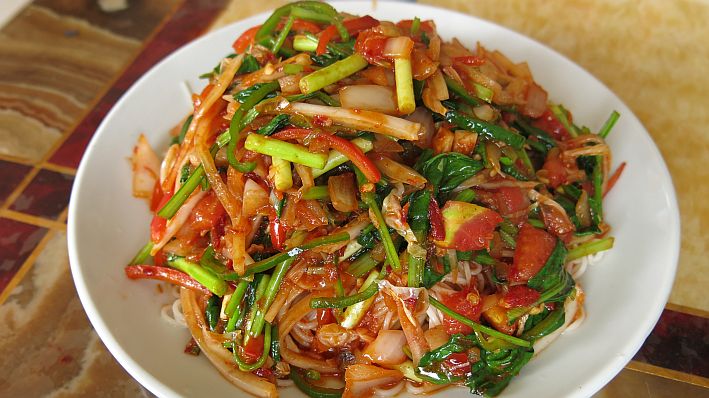
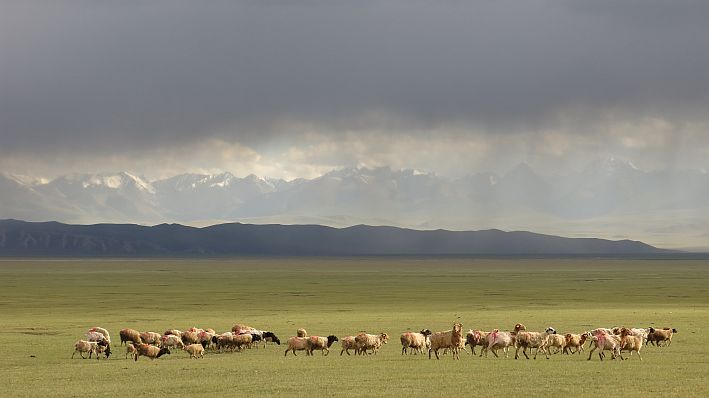
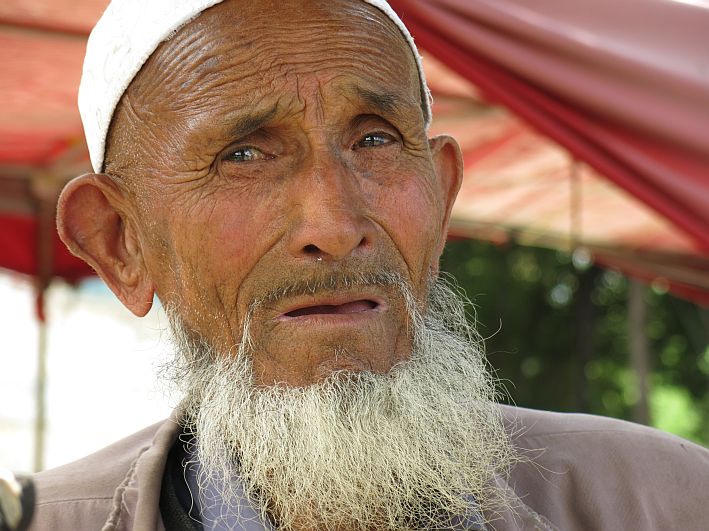
For seven long miles I cycled through a corridor secured with barbed wire – a brand new highway that, like a snake, looped from the Kazakh border to the Chinese border. There were cameras hanging on every lamp post along that highway. From then on, big brother was daily watching my every move.
The entrance hall of the immigration office looked like the lobby of a modern airport. Wow, welcome to China – the “Empire in the Middle of the Earth”.
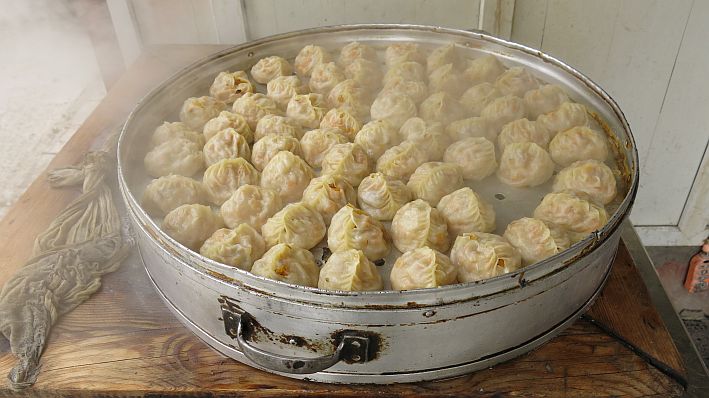
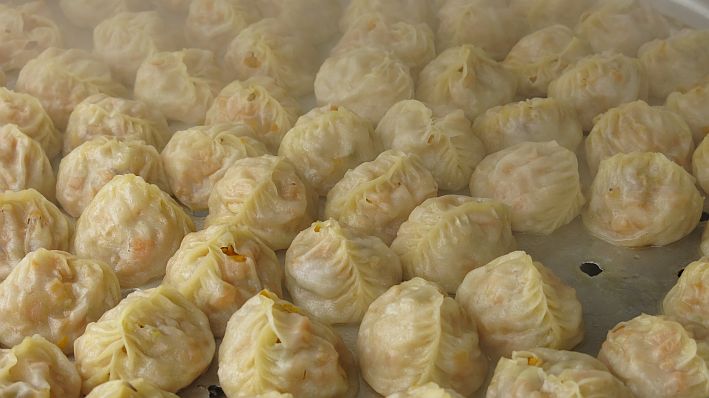
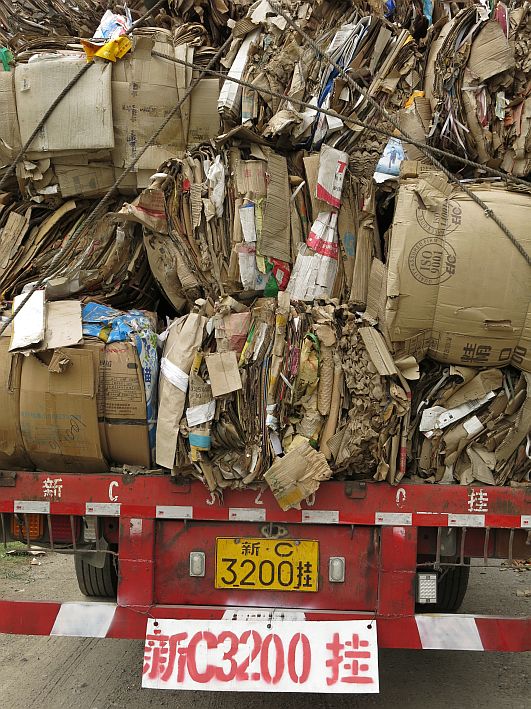
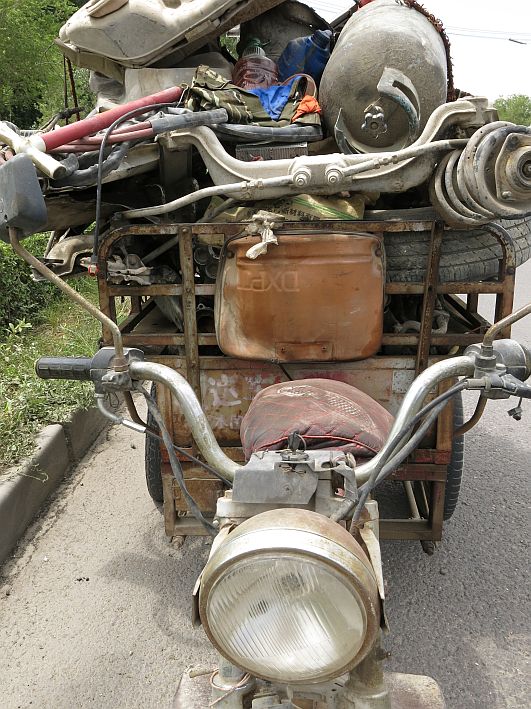
I briefly remembered the border crossing from Nepal to Tibet about 18 years ago,
where a spitting Chinese border police officer, sitting next to a stinking toilet
completely dirtied with feces, grumpily took note of me. In comparison with the way
I was greeted at this border today, it seemed that centuries had passed.
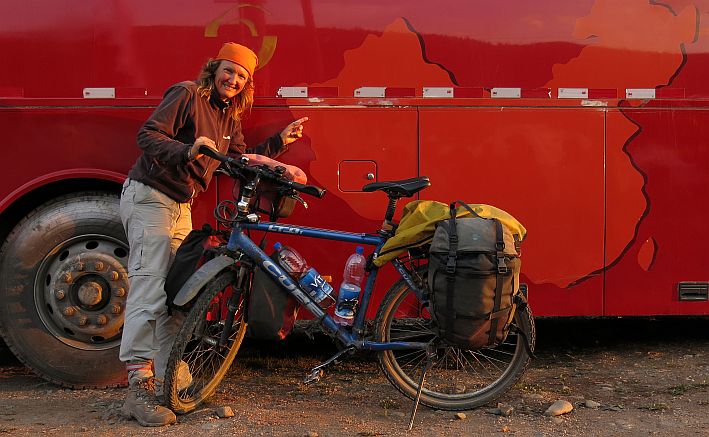
I was greeted in a super friendly way; and without any further difficulties I rolled into the third largest country in the world. With my emotions strung tight as a bow in anticipation and blinded by the gigantically wide road that lay before me, I saw the first Chinese billboards, shopping malls and countless high-rise buildings. Somehow everything appeared to be in XXL format.
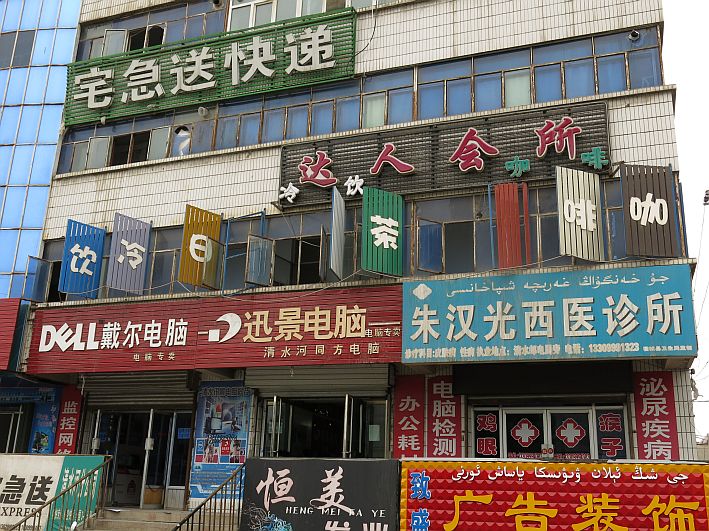
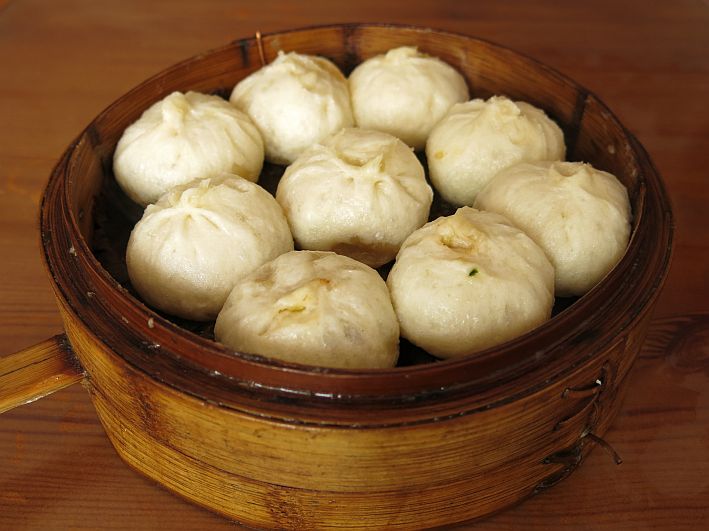
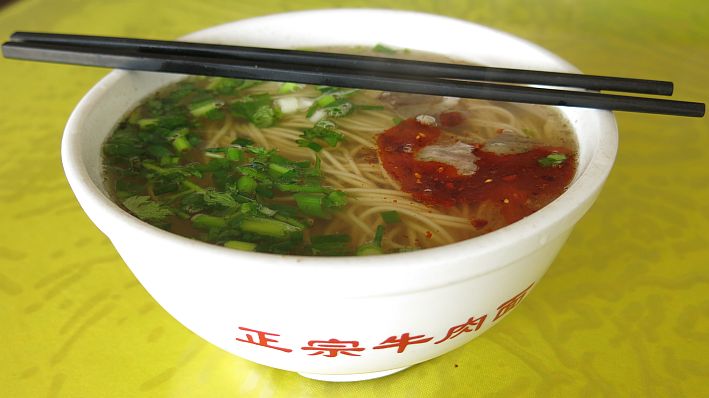
When I saw the first food stands on the side of the road, I bounced in joy back and forth on my pedals. Awesome! Finally, finally, there is something good to eat. Finally I had arrived in a part of Asia, where people really know how to cook. Soups, home-made pasta, sauces in all variations, delicious rice and vegetables, all in a top quality setting.
The market stands were full of delicacies, it was simply awesome. From now on, I wouldn’t have to eat bread that was rock-hard, no more rancid butter. Now there was hope every day to find food that matched my culinary tastes, for my streak of thirst had lasted long enough.
I realized how starved I had already become.
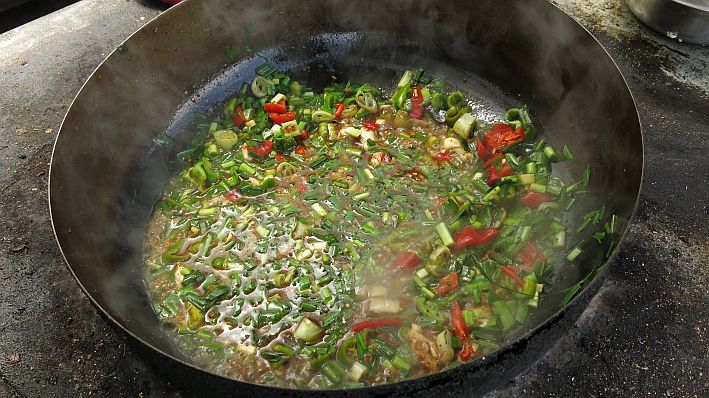
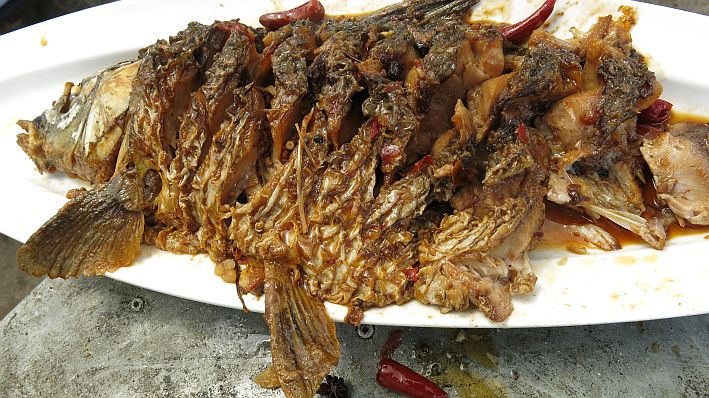
In the very first small restaurant I was immediately invited to dinner. In a jiffy, the chef conjured up a super tasty pasta dish that was so good I could have licked the plate with joy. My permanent grin made people laugh. Unfortunately, I couldn’t share my thoughts with them.
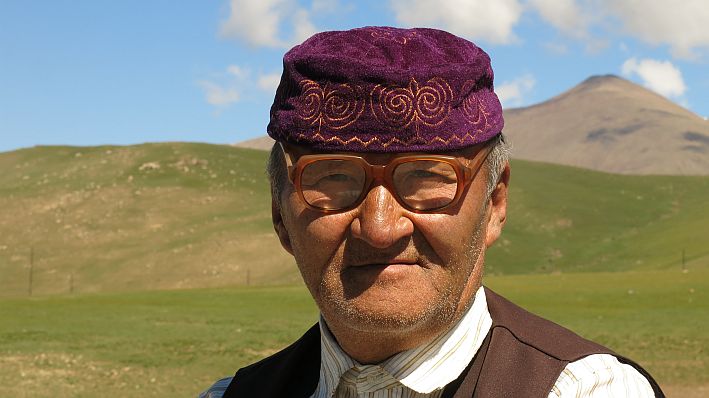
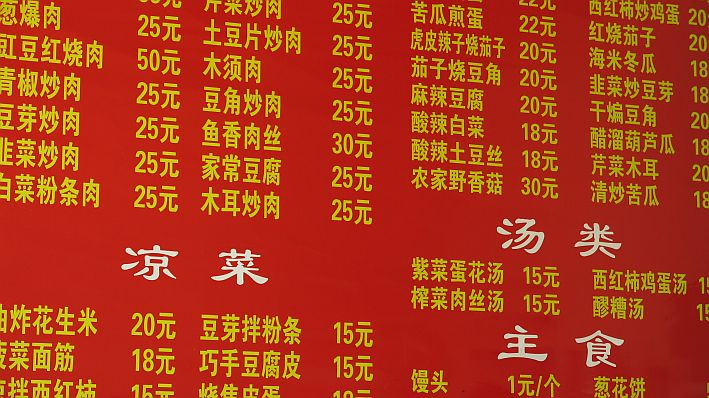
The many Uyghur continued to be obvious; they are the same population group as those in some parts of Central Asia and also known to be living here in the western province of Xinjiang. The Han Chinese are clearly in the minority here.
I didn’t worry about the conflicts that are currently simmering in the region.
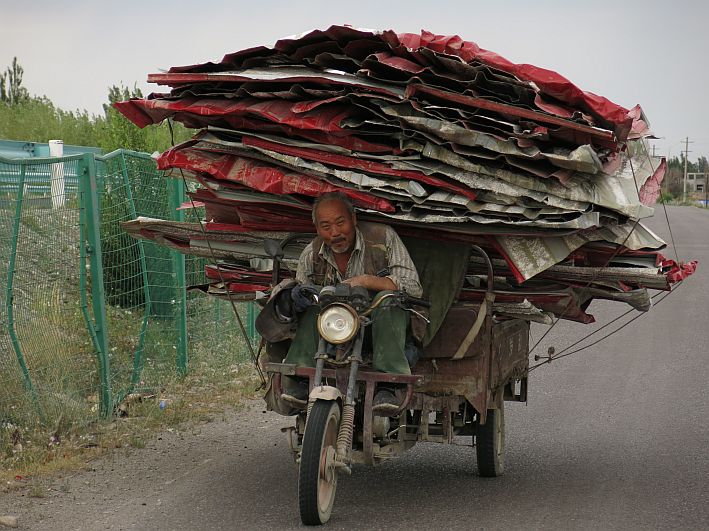
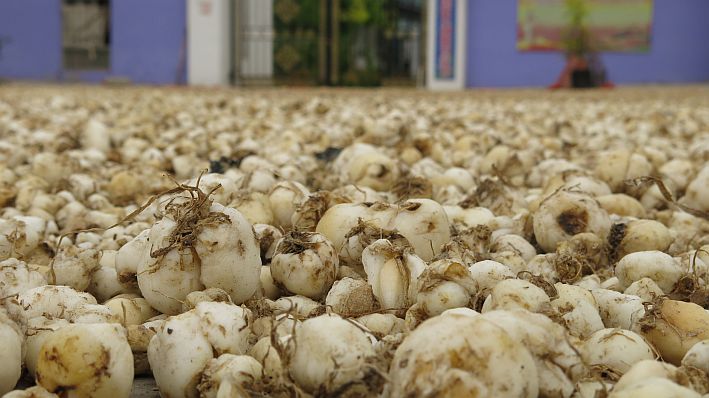
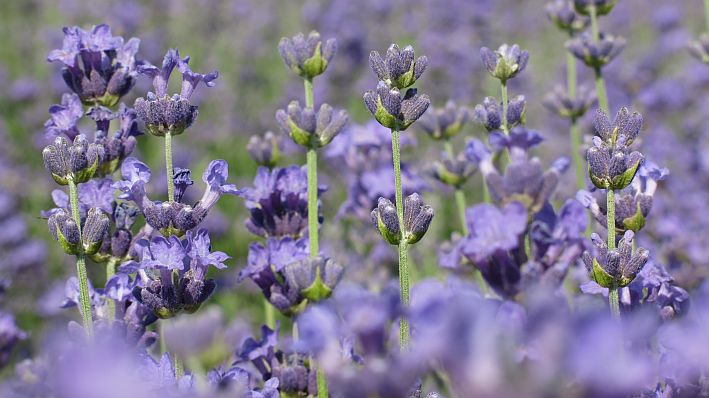
From then on, I was continually heading eastward. A gigantic country lay before me and I only had a 30-day visa with an option for a single extension.
It was enough to make one cry, but nothing could be changed. The road was exhilarating, albeit very busy, because even here in the far west of the large empire, the wooden carts and old tractors had almost completely disappeared.
Here, large wide cars were driving on the brand new roads as much as everywhere else. The world just keeps becoming more modern and everything is beginning to be the same as everywhere else in the world. But regardless, there was still plenty to see.
It was a feast in color. The houses were painted colorfully and everywhere on the side of the road many small things were lying out to dry. The lawns and courtyards were filled with saffron, lavender, tubers, and so on.
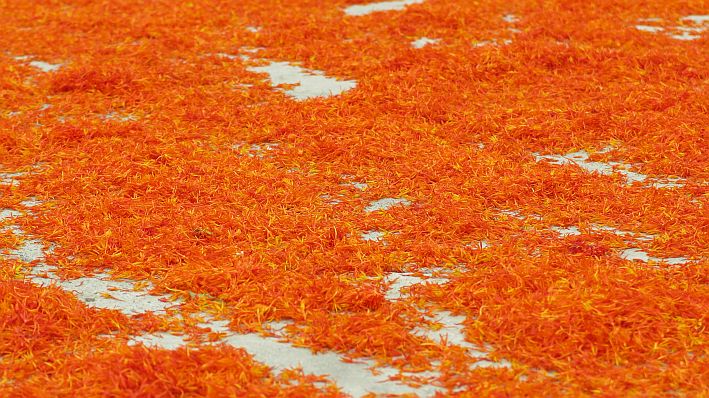
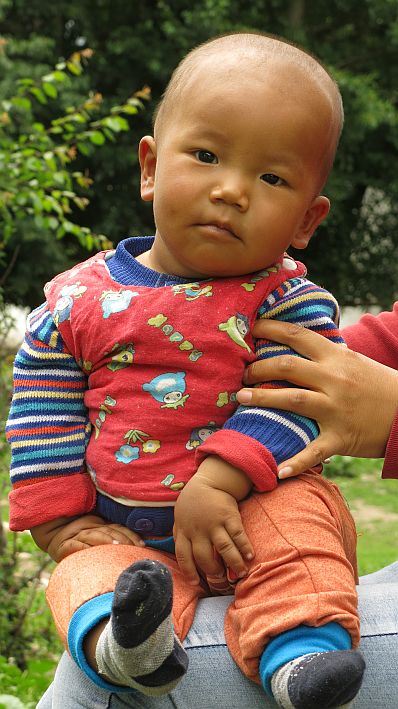
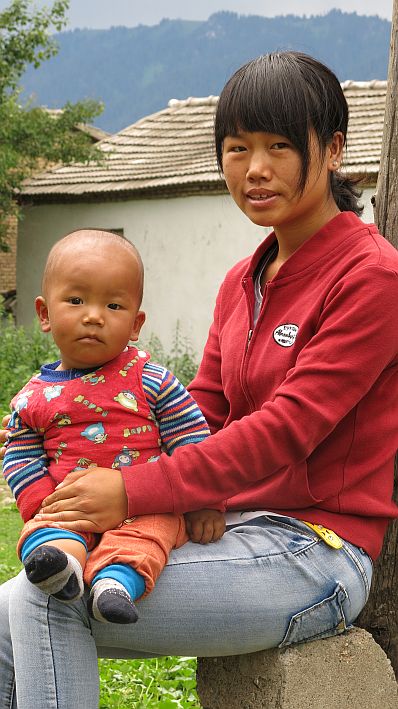
The further I rode away from the city, the more rural it became. It was wonderful. People looked at me curiously and I looked back at them with equal curiosity.
I was in China and could hardly believe my luck. I could have hugged the people and would liked to have talked to them and ask them many questions. Instead, I soaked in the pleasure for myself alone and simply enjoyed the many wonderful experiences.
It is two hours later now when the sun goes down because Beijing Time is used in all of China. That means it doesn’t get dark until around 11 p.m. and, for me as a night person, that was very welcome.
In the next city, I tried to find a hotel and was initially shocked by the prices. Additionally, I was confronted for the first time with Chinese bureaucracy. Foreigners are not allowed to stay anywhere except in upscale hotels, not in inexpensive accommodations. Oh great! My device was to sit and wait – and I succeeded. I managed to get a hotel room for 40 Yuan, which would normally have cost 240. (62 Yuan = 10 dollars).
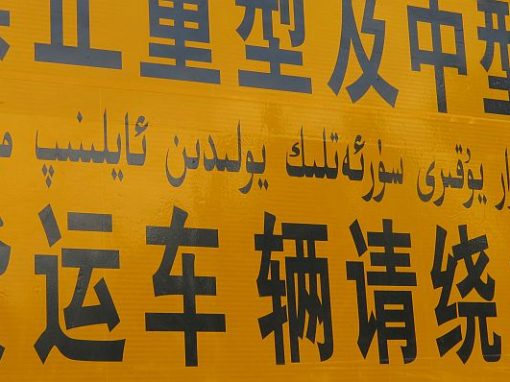
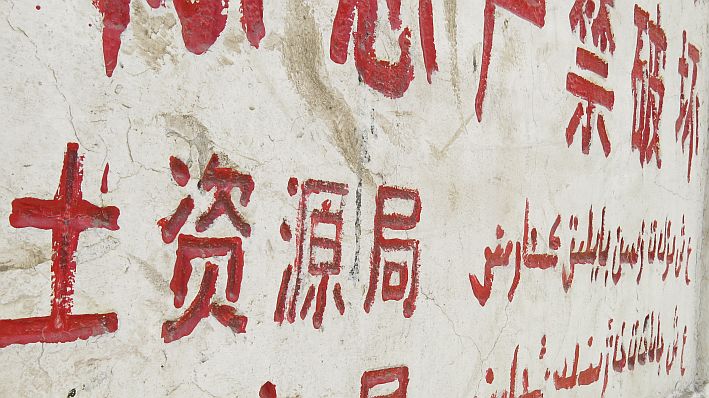
After one hour in the Internet cafe, the police visited me the same evening even though I had only opened the Web pages that were allowed, especially since you cannot open the illicit pages anyway. Even Google is blocked here. The police came so unerringly into the cafe that they most certainly aready knew that I was sitting there. Our communication was zero, but I did understand the words “pass” and “hotel”.
The pissed-off cafe owner turned off my computer and I didn’t even know what it was all about.
Finally, I had to show the police where I was spending the night. The hotel owner was accused of not registering me and immediately began to enter my data onto a form, which honestly, after 1.5 hours was still not successful because the computer program crashed again and again. Eventually I was out of patience and said, “OK, one more time and then we quit, I want to go to bed.”
Strangely enough, it was the 3 policemen who had sat there who agreed to let me go. After all, it was already after midnight.
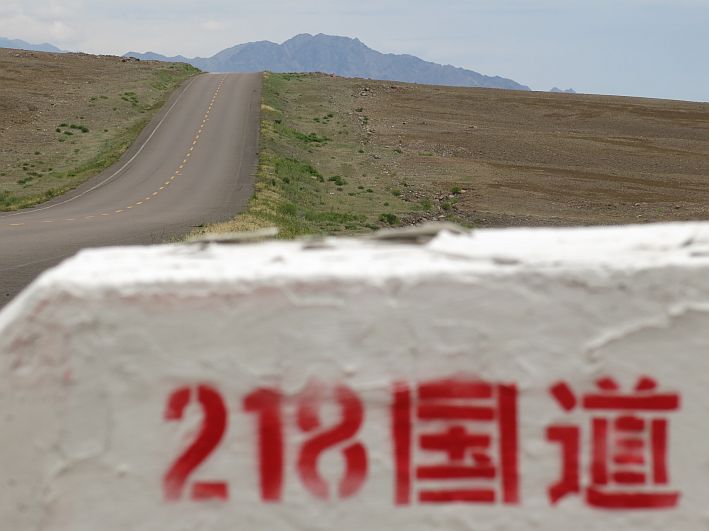
I turned onto the G218, which initially went through the Large City of Yining.
It reminded me a little bit of Chinatown in New York. Everywhere, there were blinking lights,
huge signs, one cell phone shop after another, music, junk, people and honking.
In a way it was a topsy-turvy world, or perhaps I was not accustomed to such cities anymore.
In any case, I was truly amazed about what had become of the China I had known back then.
I foolishly tried my luck again to find place to stay for the night here, but that notion ended
up in a dramatic situation. Only upscale hotels. Even there, no one spoke English.
I rode across town from one hotel to the next and, eventually, I discovered a sign
that said “Guest House,” but unfortunately everyone was allowed there except foreigners.
It was really clever to put up a sign that the Chinese cannot read. There were a few more
cheap hotels that were also not allowed to accommodate me. Finally, after about 2 hours,
I tried my luck at a 2-star hotel and tried to make a deal with them. Communication,
as always, was a bit difficult and in the end, the receptionist called someone
and I was asked to “please wait.” And who showed up? The police. Four men stood now
in the hotel lobby and I tried to do my best to explain my situation. Another hour passed,
until finally a policeman came to me and said I could stay there for 100 Yuan.
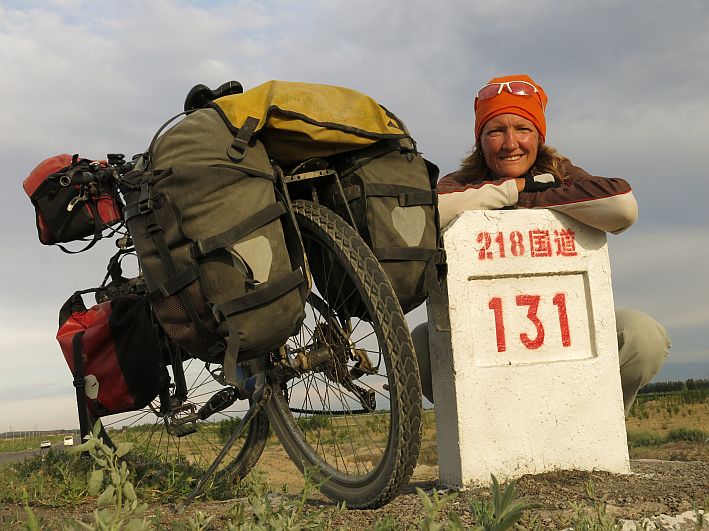
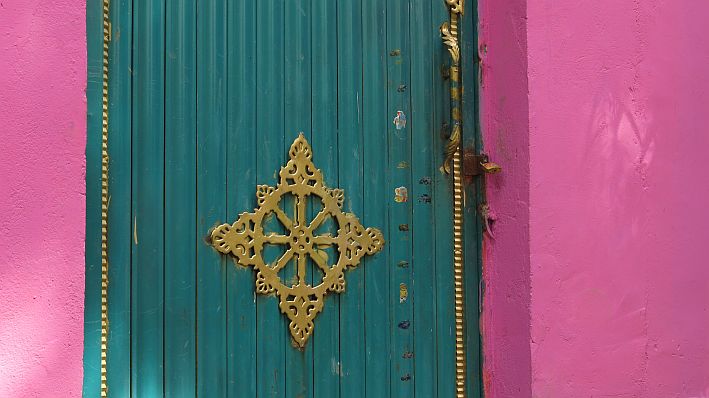
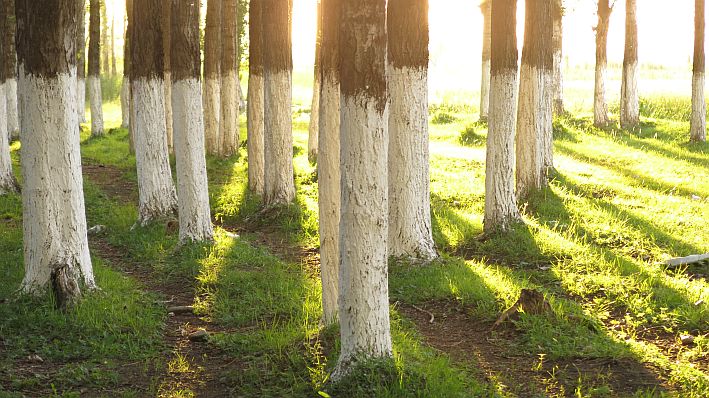
The next day started with a strong headwind, which eventually died down during the day.
The scenery was beautiful. Not overwhelming, but definitely not boring. I camped
with people right next to the highway and was invited to join them for grilling.
For breakfast we had black tea with cream, milk, without sugar and a loaf of bread
that was hard enough to beat someone to death with. Even dipping the bread didn’t help
it to become soft. Of course that made sense; I was eating breakfast with the Uyghur
and not with the Chinese.
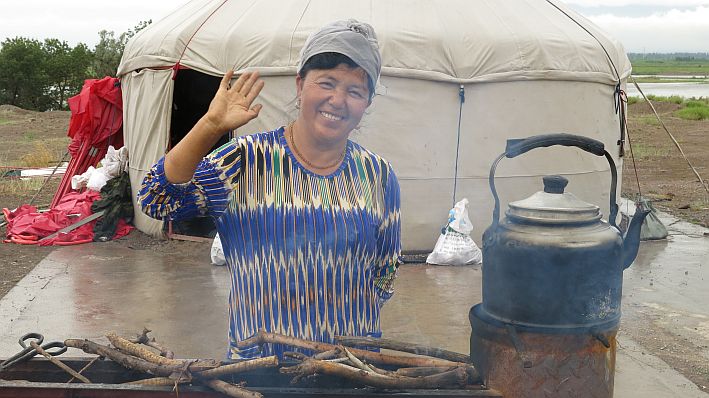
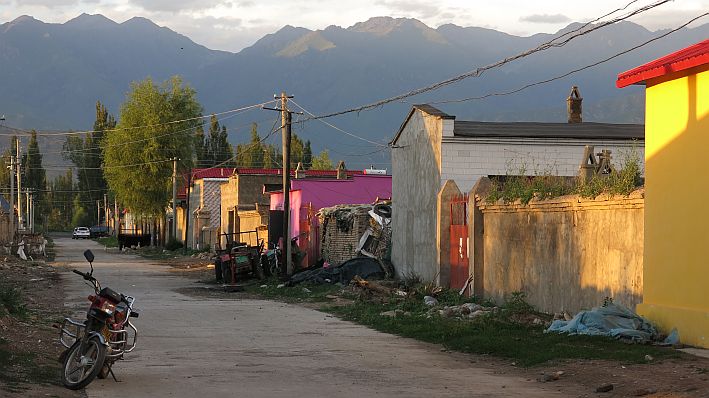
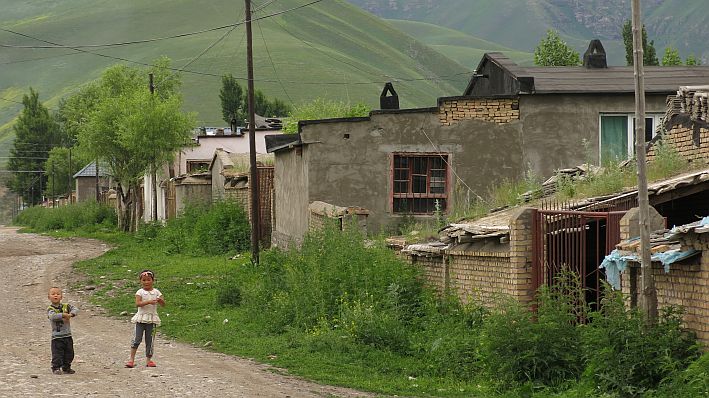
I met two Chinese who were riding their bikes to Lhasa. We rode together for half a day
and ate in a small “shack” restaurant for lunch. Again, the food there was sensational.
The three of us divided the large portion of food and we all ate from the same plate.
It wasn’t the first time and I had gotten used to it. That food was the very best I had eaten
throughout the entire trip. The vegetables were so delicious I could have crawled onto
the plate. Honestly! It was even better than my mom’s Christmas dinner
and Birthday Cake combined, simply because I was so starved.
In the evening the two organized a place for me to camp in the police compound
of a small village. Unfortunately, I couldn’t read the village signs, so I had no idea
where I was at the time. Of the curiosity seekers who surrounded me, one man
was so excited about my trip that he invited me to his restaurant for dinner.
Super nice. Everyone was Uyghur, thus Muslims. No matter where you find them,
they are incredibly hospitable.
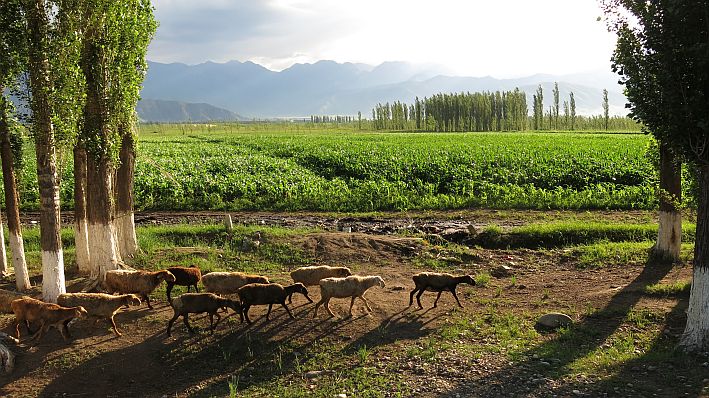
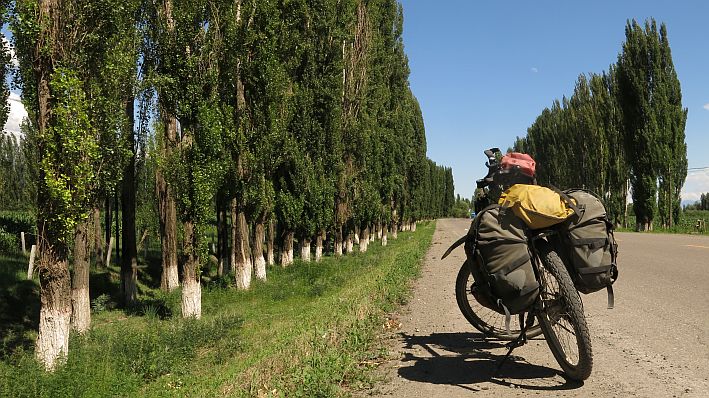
The road seemed to have no end, but it continued beautifully through an endless
avenue alongside picturesque mountain ranges. In the evening I asked if I could camp
at a mosque and was then allowed to sleep in the home of an old man. Again, the same thing
happened to me as previously on my trip; the old man was only 3 years older than me.
It’s crazy how one can miscalculate the age of people here.
I camped outside on the lawn.
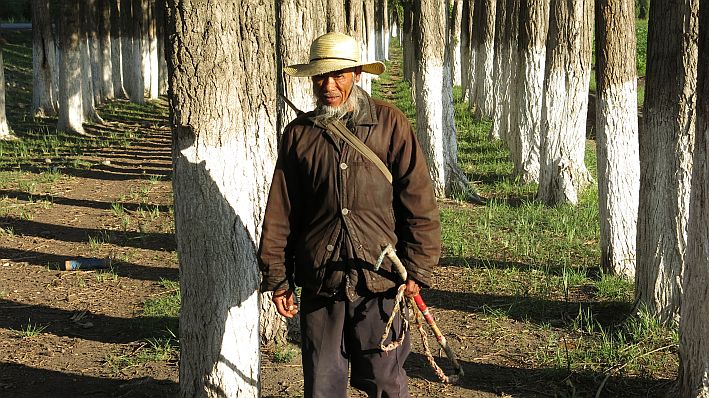
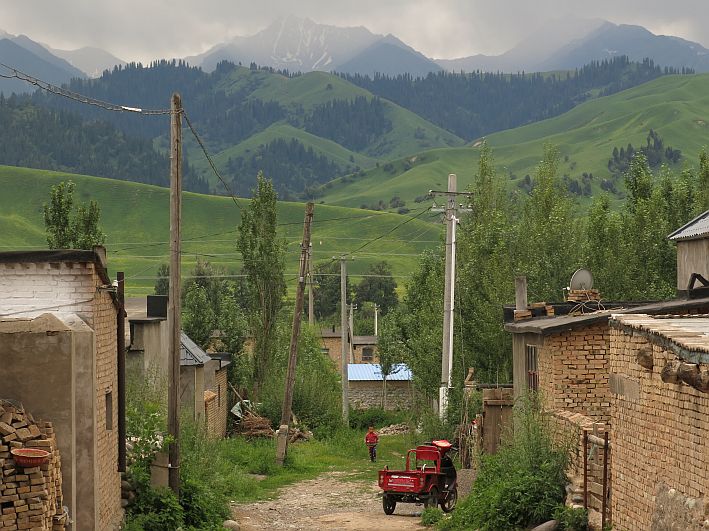
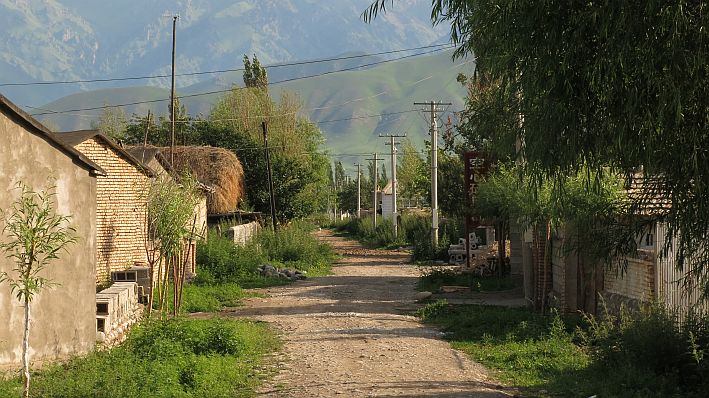
The landscape became continually more impressive; the mountains increasingly fascinating
and the road led me endlessly upward.
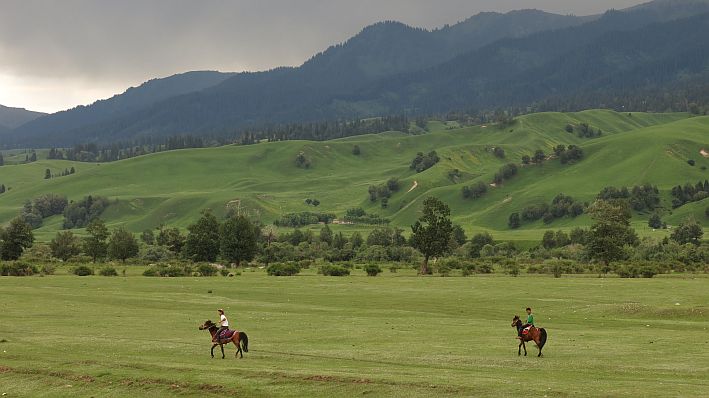
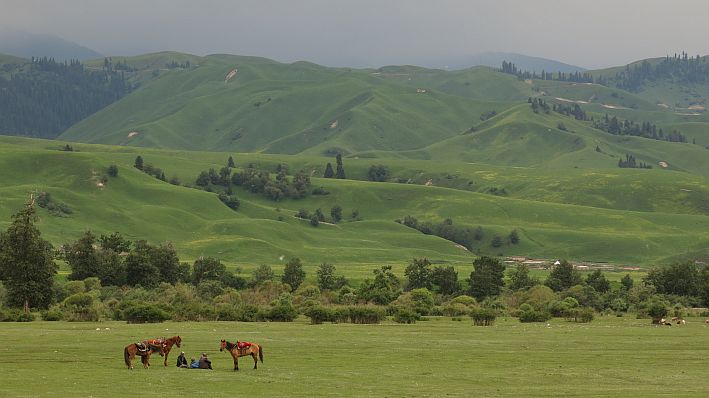
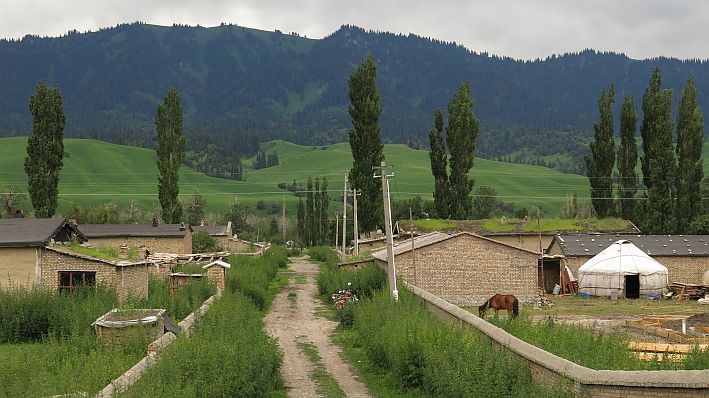
At the foot of the first 3200-meter high pass, I camped with a group of Han Chinese,
who spent the night in yurts made for tourists. We danced together on the meadow
and I was photographed countless times.
I am photographed here regularly and non-stop anyway.
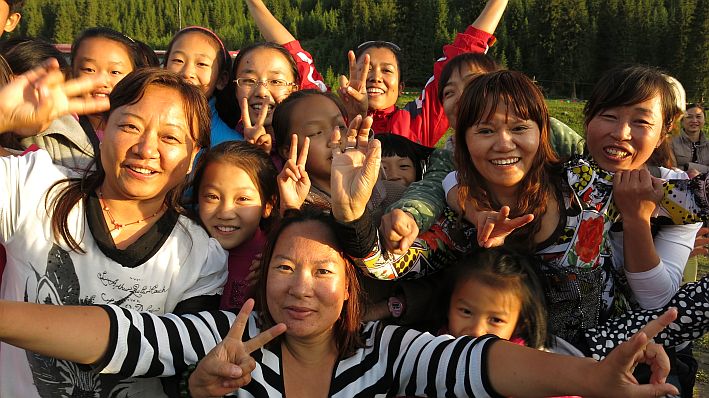
The nature of the Chinese is somewhat hysterical and it somehow reminds me of Americans.
In my opinion, they make a lot of noise about nothing.
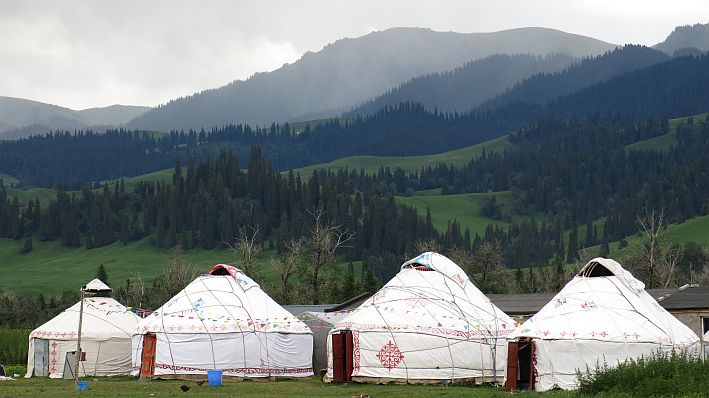
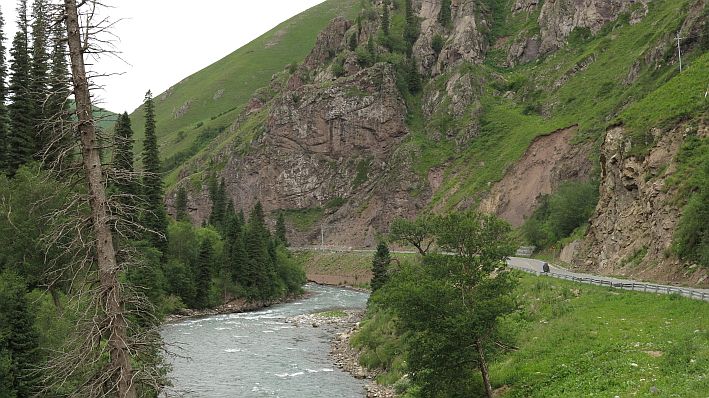
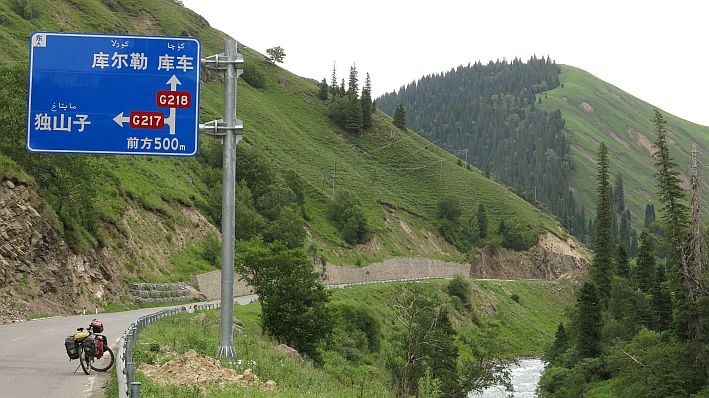
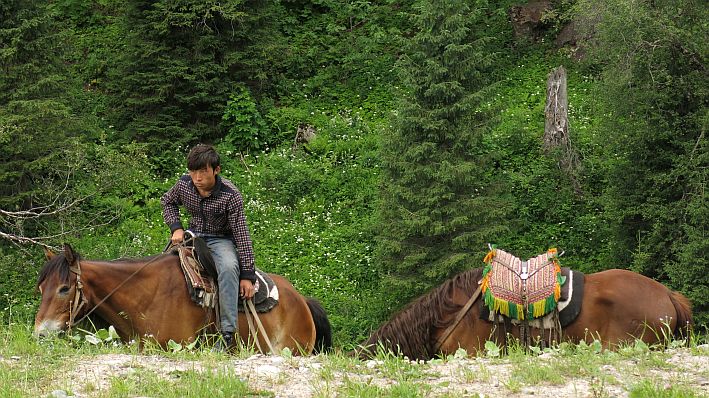
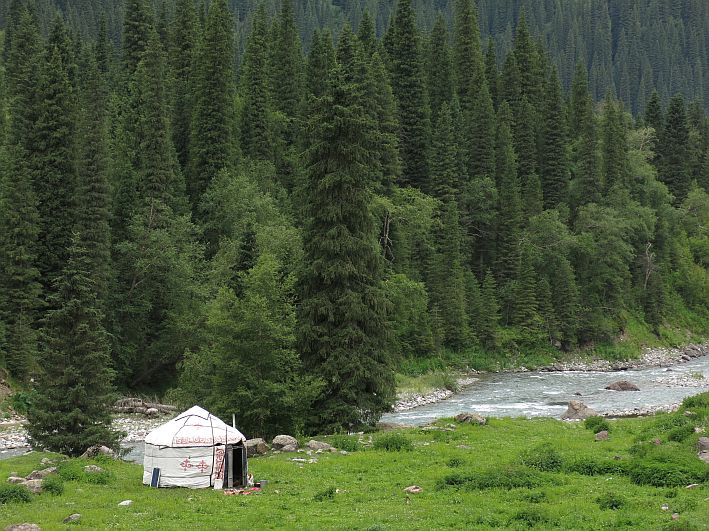
The pass was so foggy that I could see absolutely nothing. Moreover, a brutal wind
was blowing and it was icy cold. When I saw the first prayer flags on the summit,
I was full of anticipation, because Buddhism is my favorite religion. Mongols live here
in the area as well, so there were more and more Buddhist symbols along the trail.
Mosques, on the other hand, became significantly less in number.
The signs were sometimes in 3 languages: Chinese, Mongolian and Uighur.
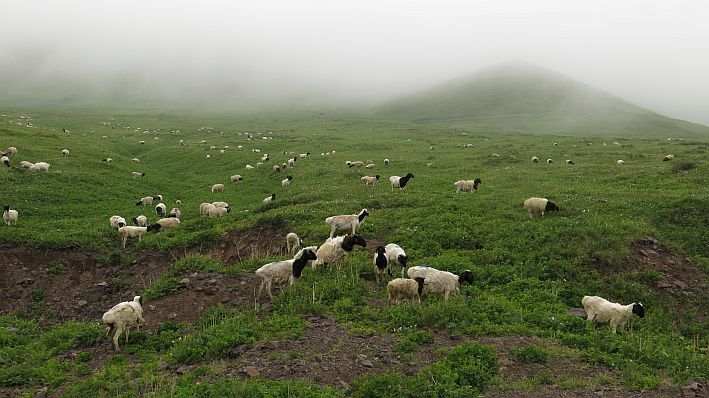
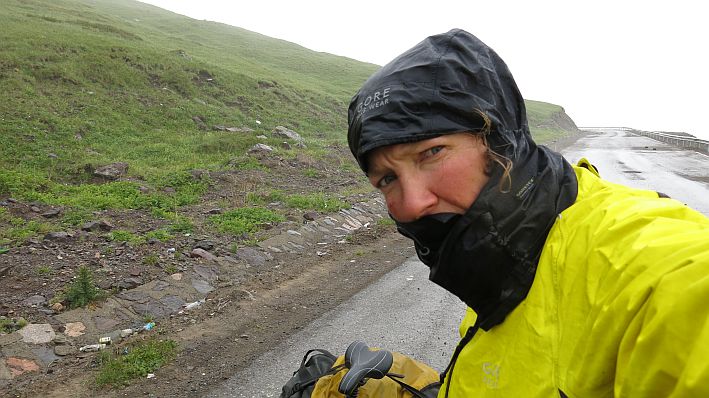
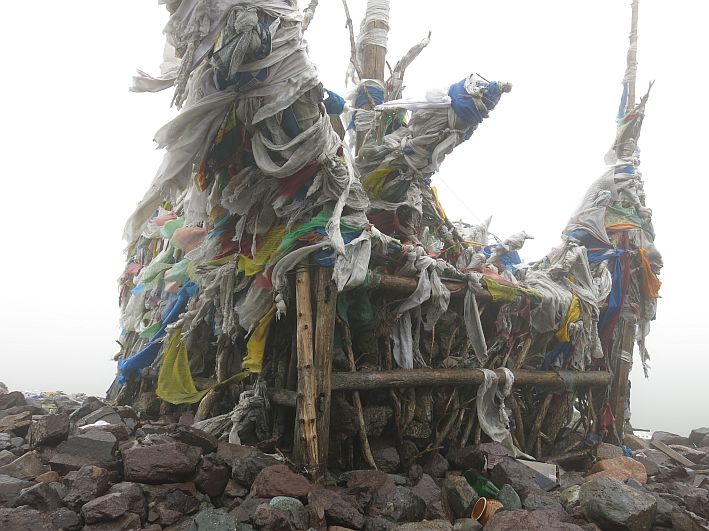
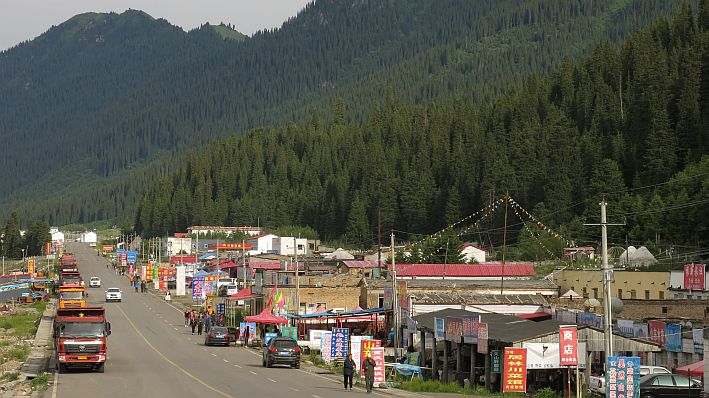
I met four Chinese cyclists on their way to Tibet. They remained in the village where we met,
because they had a strong headwind. In contrast, I was racing with the wind in an easterly direction
– that is, until it switched around and it began to rain. Only a short time later,
the sky enchanted the landscape with a myriad of colors and it was simply dreamlike.
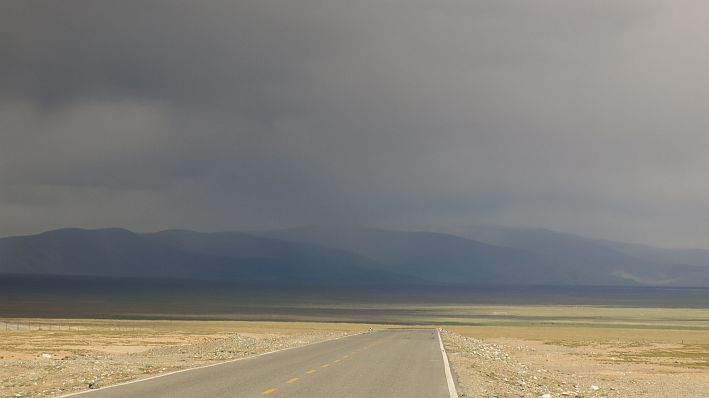
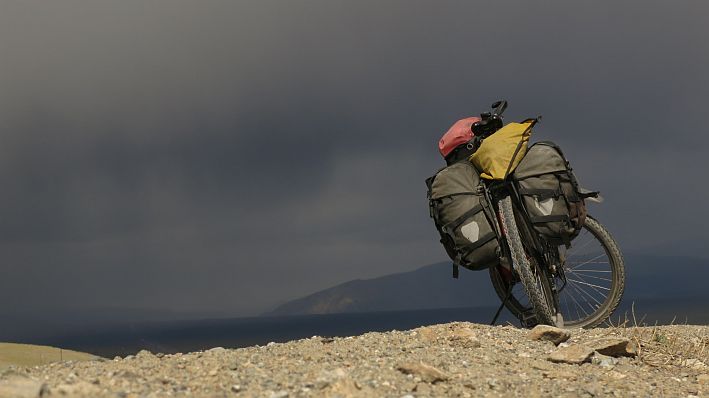
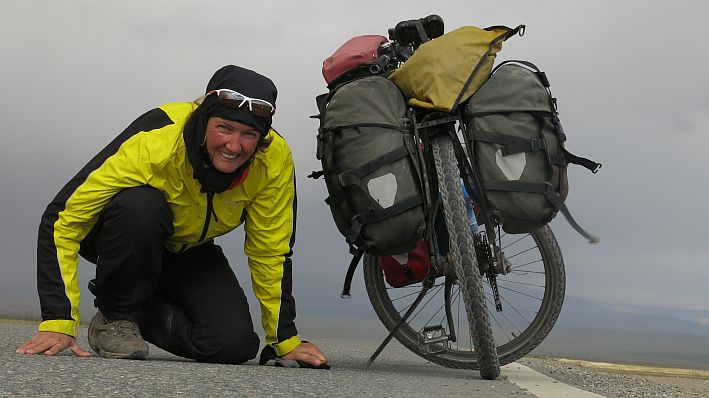
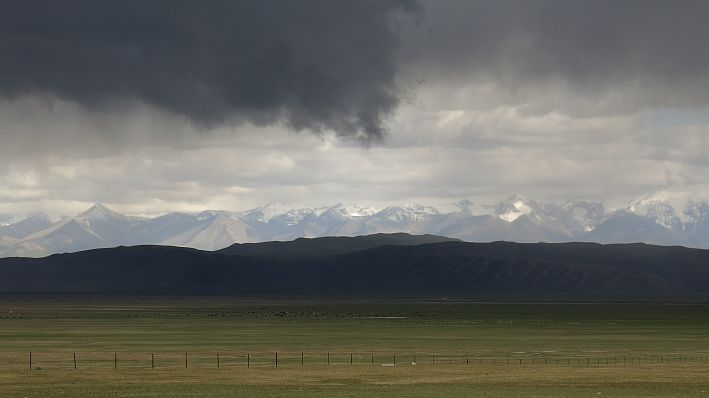
A car stopped and a Chinese man got out and said “we met each other in Yazd in Iran.
We stayed overnight together in the dorm. Sometimes the world is not only extremely
vast but, from time to time, it is also very small.
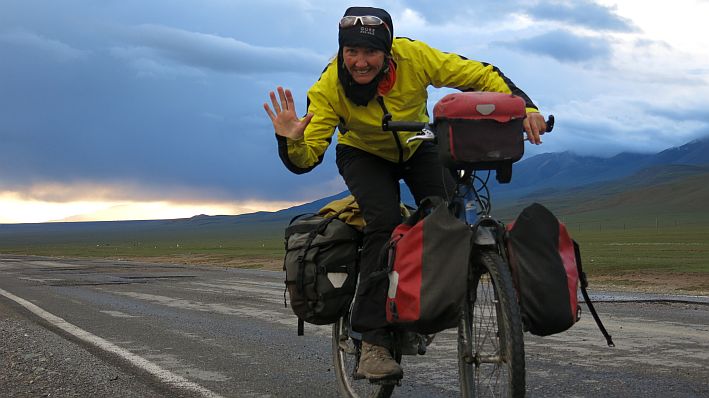
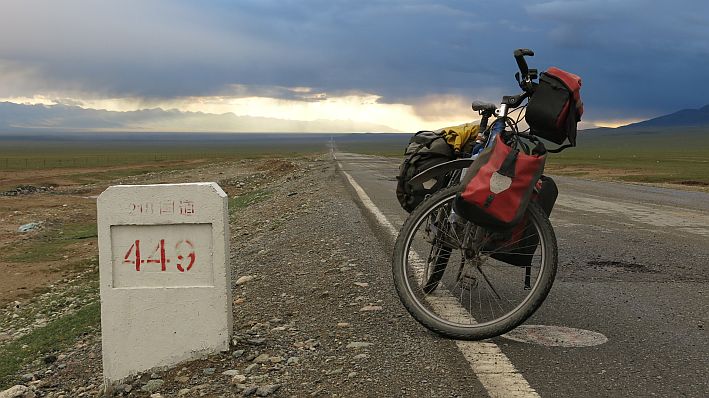
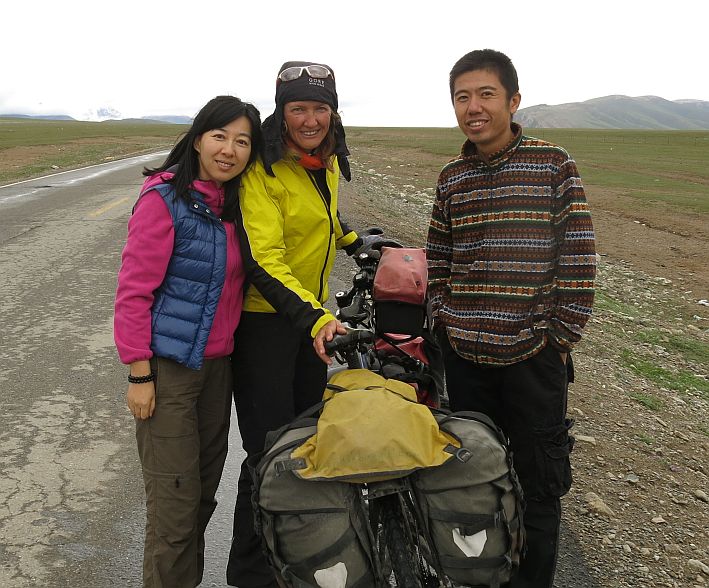
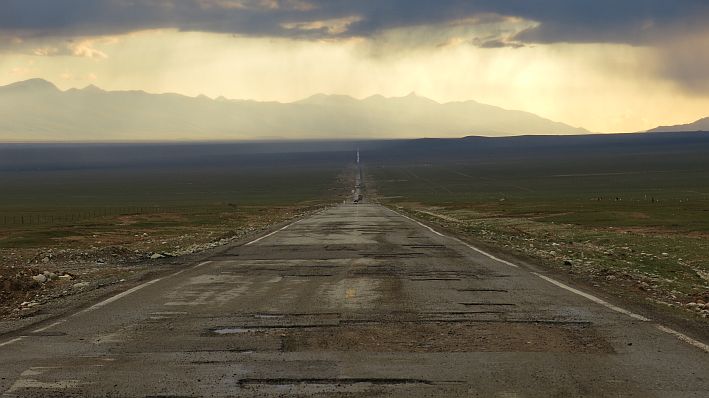
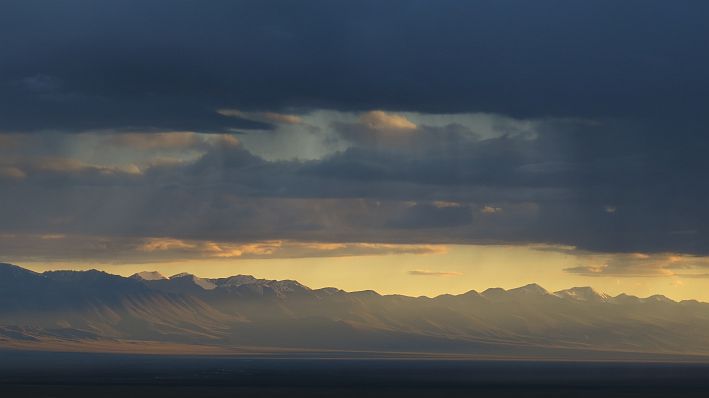
A short time later, I asked about a place to pitch my tent in a village and some Kazakhs
kindly offered me their yurt. It was so freezing cold at nearly 3000 meters, that I pitched
my tent inside the yurt to become tolerably warm. For dinner I was invited into the house.
Once again, I was given bone-dry bread and rancid butter. For breakfast, of course,
the same thing again. Yuk!
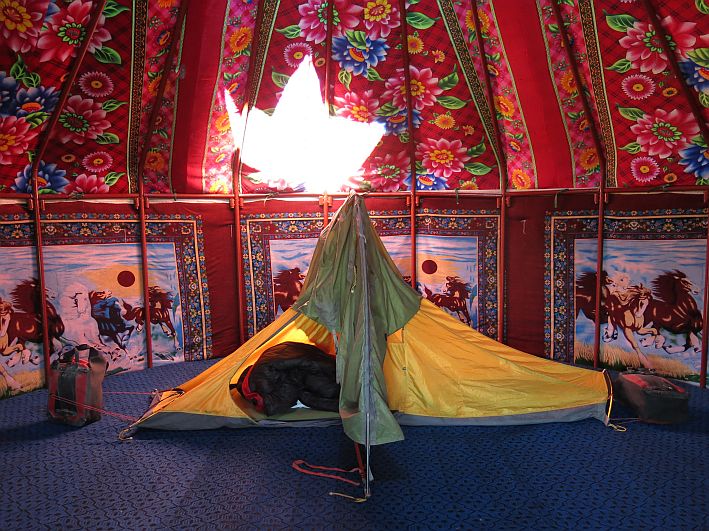
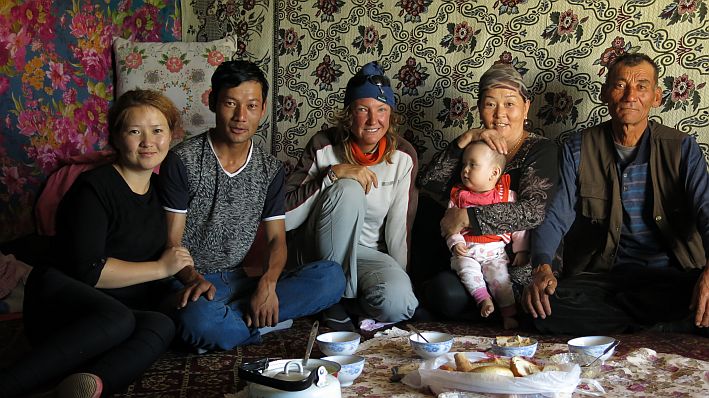
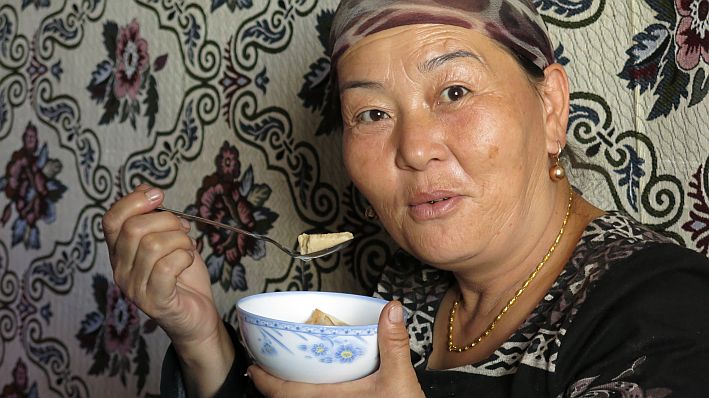

There was one more pass and, from then on, it was all downhill.
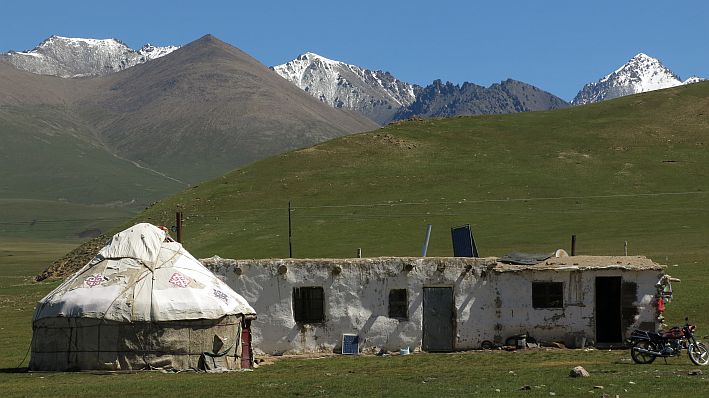
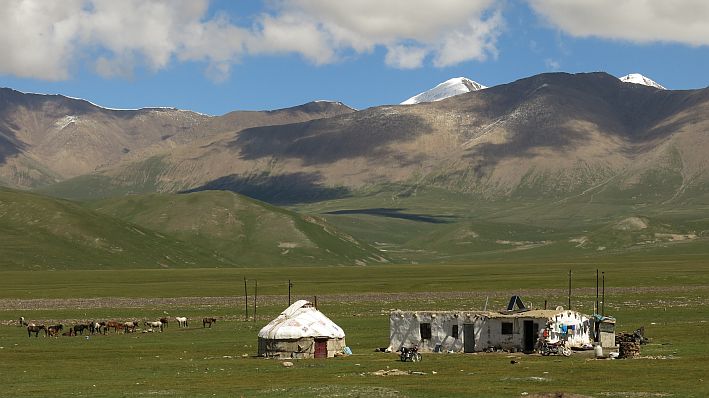
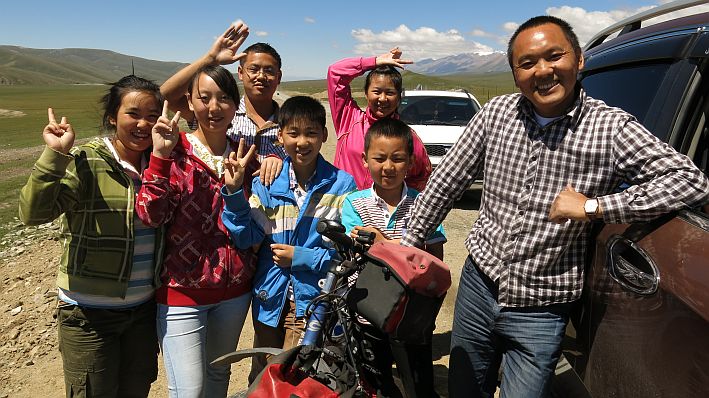
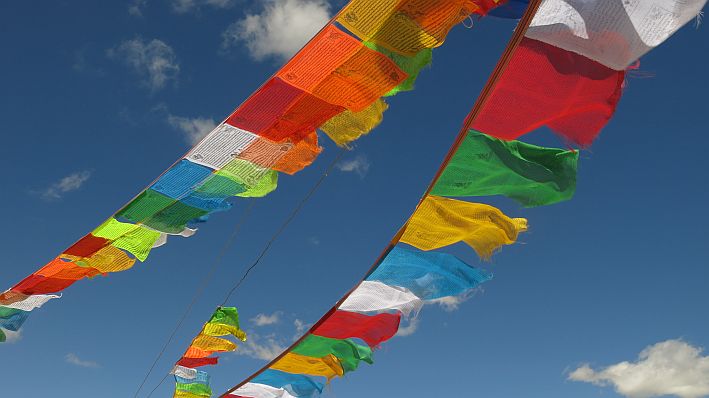
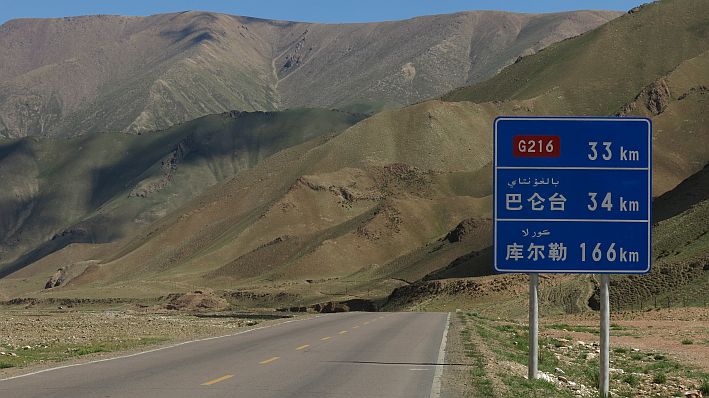
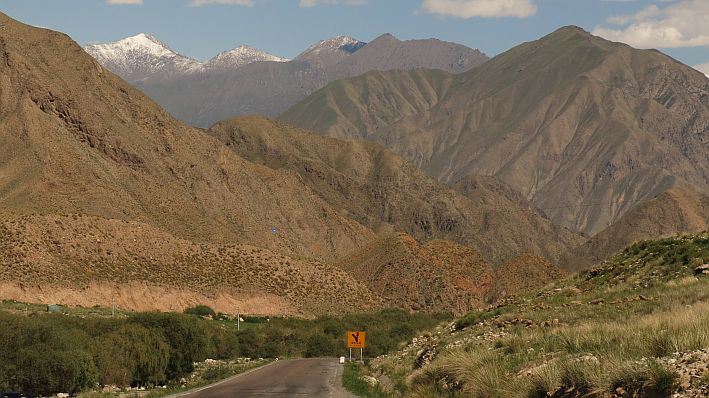
I rolled through a gorgeous landscape towards the next village. A family stopped me
and asked who I was and what I was doing. Out of sheer enthusiasm, they gave me cookies,
sweets and even a little money. When I arrived in the village, I was invited to dinner,
but again I was not allowed to stay in any of the accommodations.
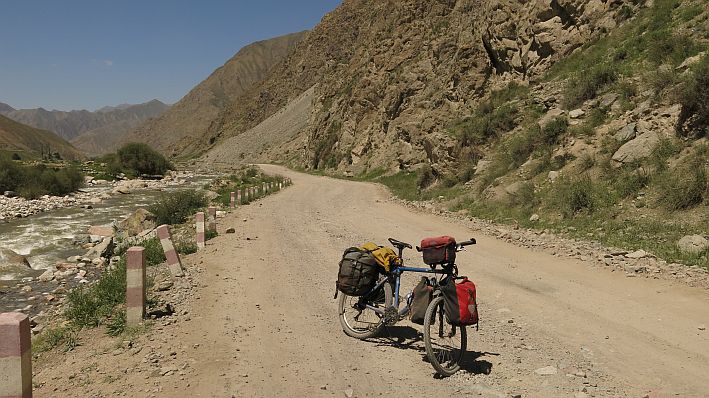
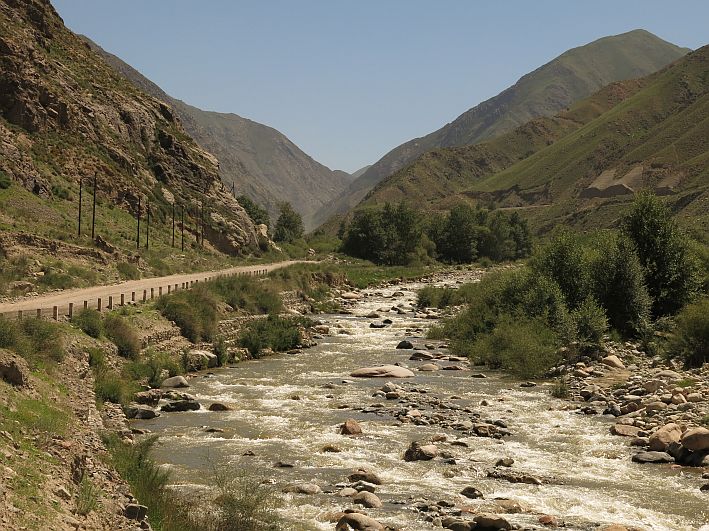
So I continued on a brutally dusty road towards Turfan. The road snaked beautifully
in a river valley parallel to the railway. But the many trucks that constantly drove past me
kicked up so much dust that it was only possible for me to admire the landscape now and then.
When I arrived in a small village, it was already dark, and the police allowed me to spend
the night in their compound. Two cheerful policewomen, who were really in a good mood,
looked after me terrifically.
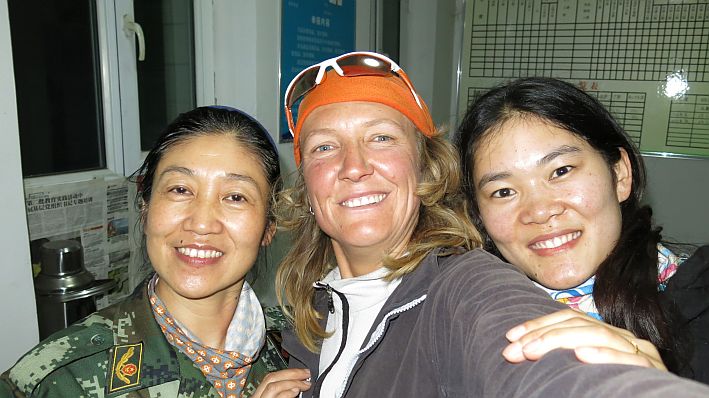
It was a very strange regulation. The police wouldn’t allow me to sleep in the cheap hotels,
but camping in the police compound – that’s not a problem.
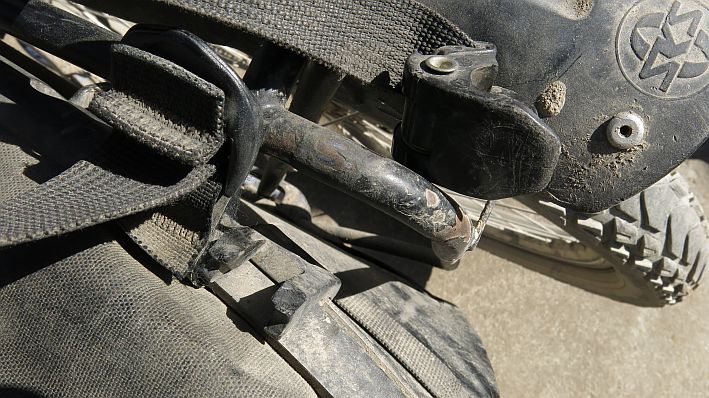
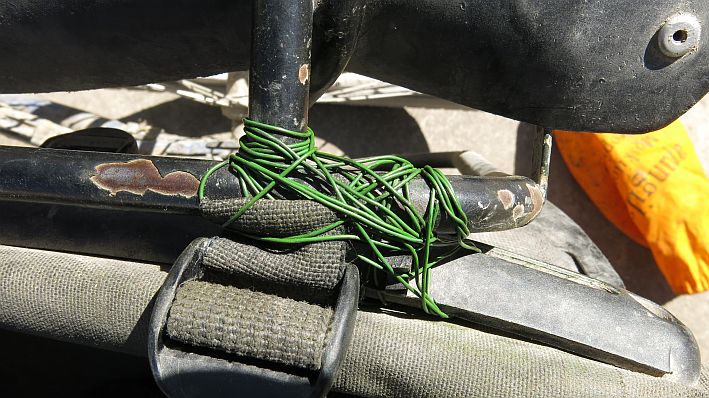
I continued along the dusty road which quickly changed into a brand new asphalt highway.
At this intersection I then had to make a decision – Mongolia or China.
Mongolia lay to the north, China to the east. I chose China and decided to visit Mongolia
at a later date. I think the main reason was really the food, because the Mongols
are not renowned for their cuisine and I wanted to continue to eat well.
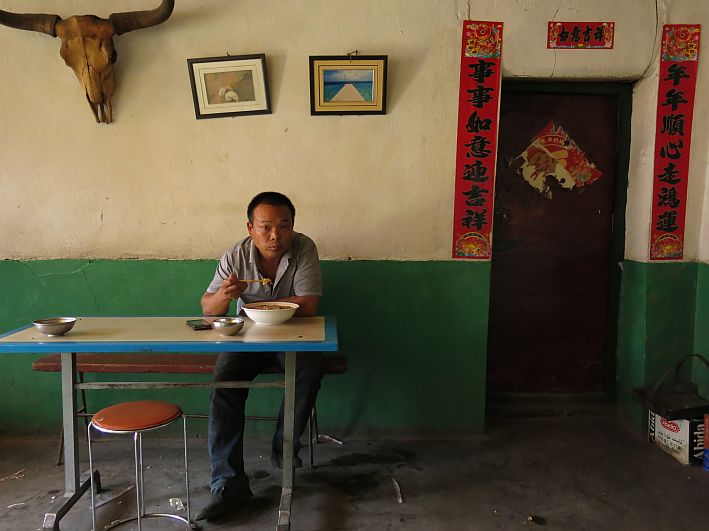
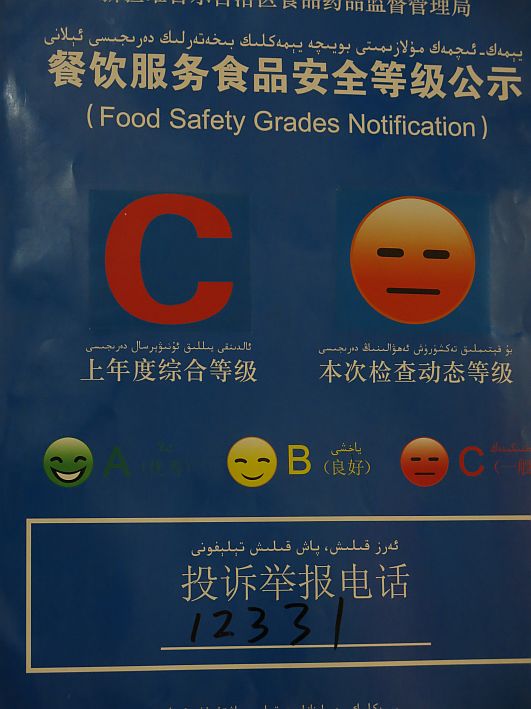
Unfortunately, that day I didn’t get far. A storm moved in and the wind was blowing
viciously from the wrong direction. I entrenched myself for a while in an underpass
channel, but it was bitter cold and there was no improvement to the weather in sight.
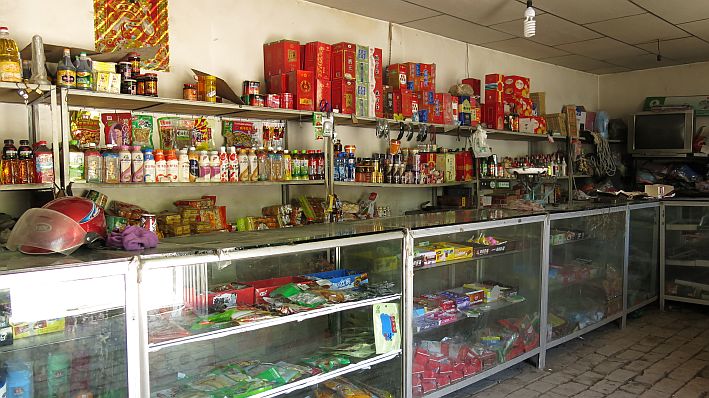
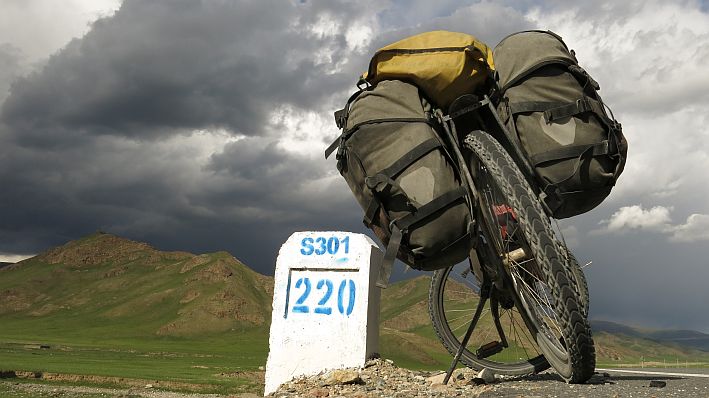
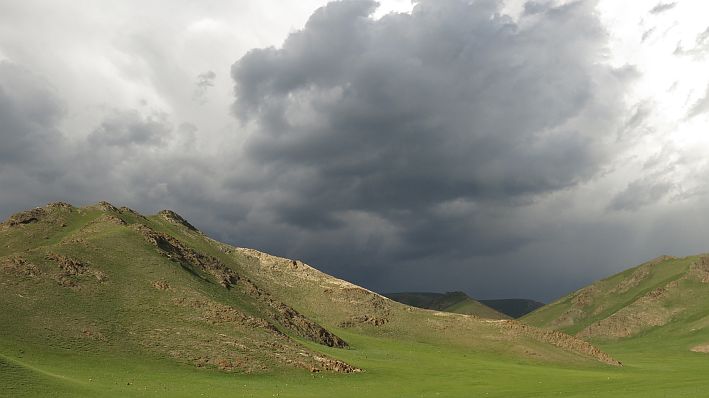

I pedaled on to a row of houses and asked if I could pitch my tent in a place where the wind
was blocked. Instead, I was given a room for myself. Somehow, it must have been a room
that is normally rented, but I was allowed to use it free of charge and was even served dinner.
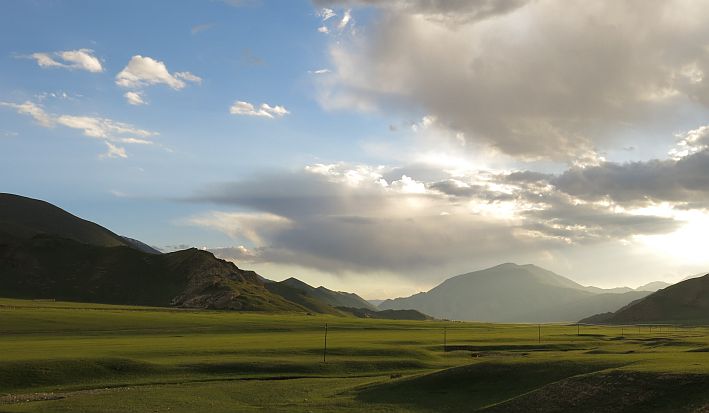
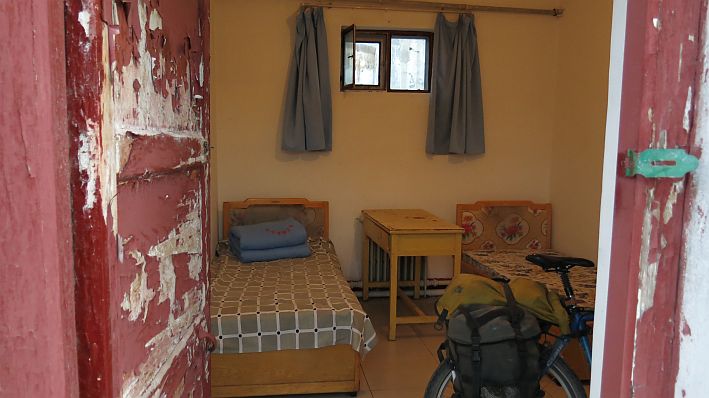
So far I have to say that I’ve been totally delighted about the hospitality of the Chinese
and the Uyghur in the Xinjiang Province where I am currently underway. Previously,
I was always of the opinion that the Chinese were stuffy and unfriendly. I have to admit
I was very wrong. Everywhere I’ve been greeted in a super friendly way
and treated in a totally accommodating manner. It’s really a tremendous
amount of fun to be on the road here.
The Chinese are curious, even extremely curious, but after they’ve seen
and touched everything, their interest soon wanes and they go their separate ways.
In the morning they allow me to sleep as long as I’d like, and everywhere else
they allow me enough space for myself – very pleasant.
Also, they don’t really spit around here much, they don’t snuff their noses loudly
and they only slurp discreetly. Maybe that will increase in other regions; we’ll see.
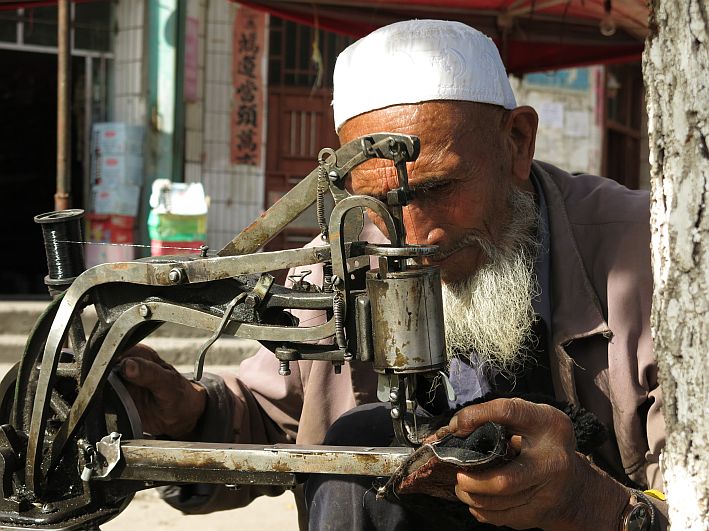
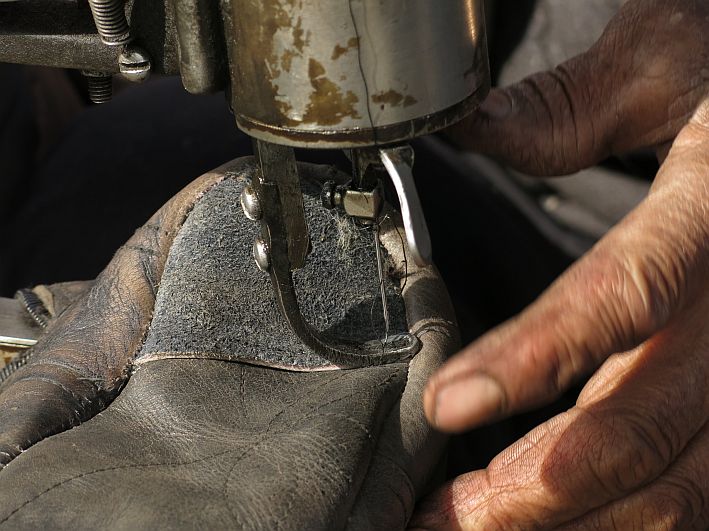
The people are loud. They don’t talk with each other; instead, from my point of view,
they shout at each other. If a group of Chinese enters a restaurant, you might think
the world only belongs to them. Chaos materializes, an intolerable noise level
suddenly breaks out, and you get the feeling the people are going to take the place apart.
They also argue with each other a lot. Again and again I see people arguing loudly
and yelling intensely at each other.
Sometimes it’s almost embarrassing.
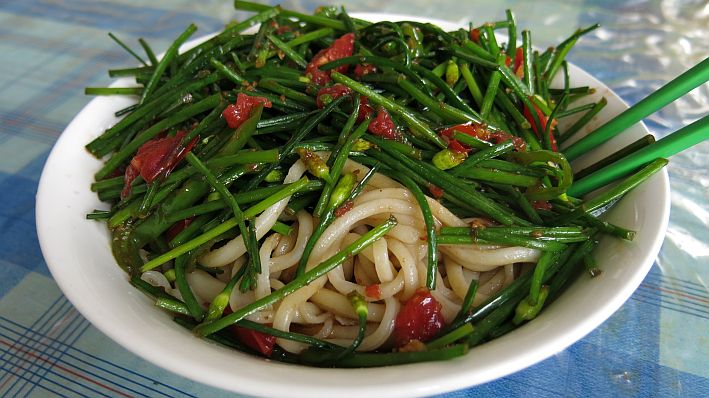
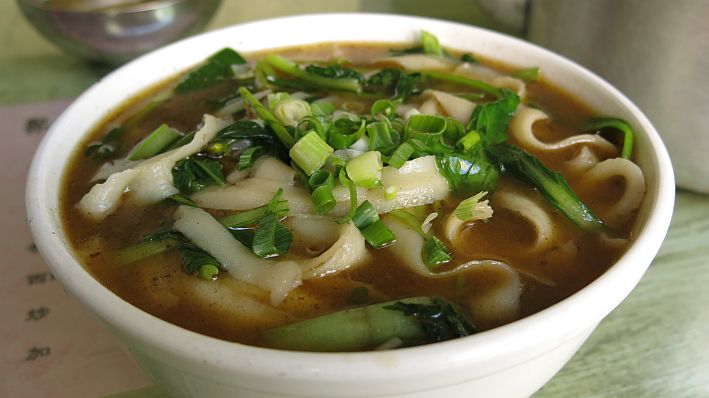
Green tea and sometimes broth always accompanies the meals. Sometimes,
there is only hot water or noodle water. For me it is a wonderful way to replenish
my need for liquids. Also, there are many places where you can fill bottles with boiled water.
Often the Chinese order a lot of food, so much that they can’t possibly eat all of it,
and consequently, very often a lot of food is thrown away.
It’s a custom that I really can’t consider to be very positive.
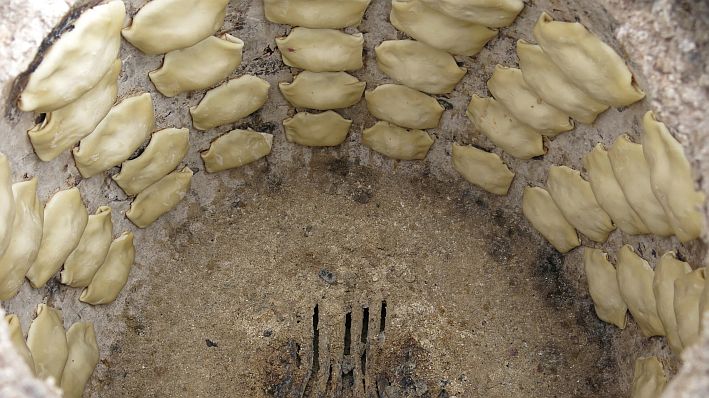

Of course, a lot of rubbish is then lying around everywhere, and in the villages,
it looks pretty bad – there’s no trace of anything modern there. Construction is going on
endlessly – streets, new homes and renovations.
In reality, the province is one non-stop construction site.
There are many solar-powered systems, wind turbines, electric scooters
and electric cars and the exhaust fumes of the old trucks are not nearly
as dramatic as they were in Iran.
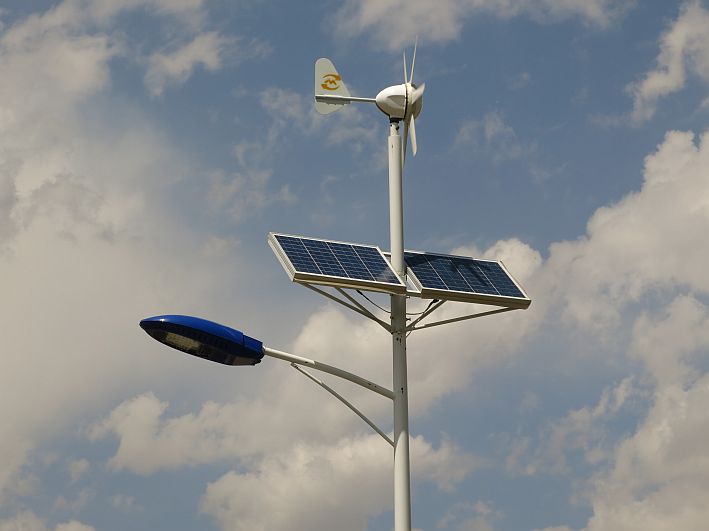
Everyone likes to play games. Outside on the park bench, in the pubs
and even in the streets, men and women sit and play cards,
Mahjongg or other games.
In public places you frequently hear music to which several people dance together
or are doing gymnastics. It’s very amusing to watch.
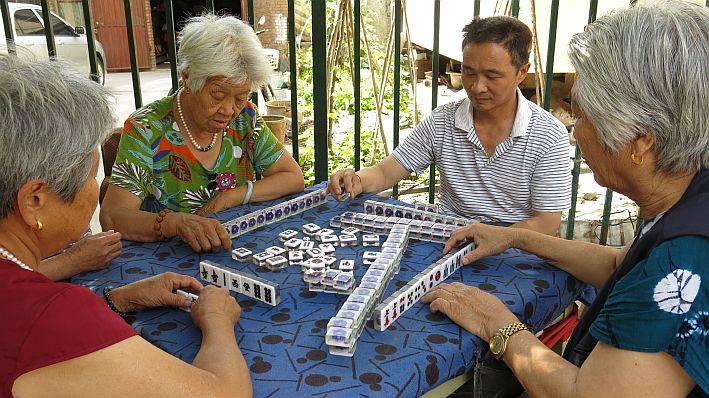
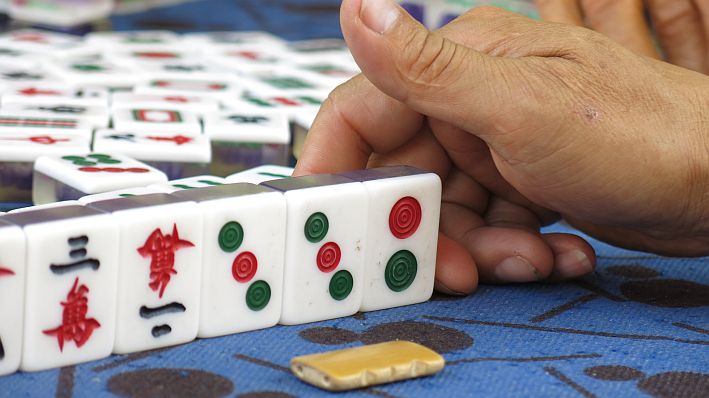
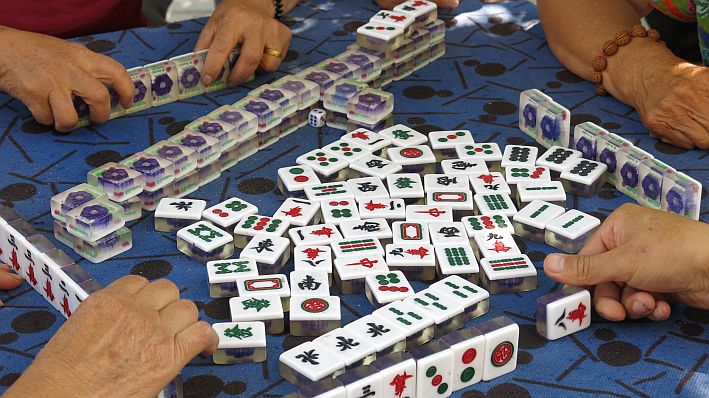
Smoking appears to be a national sport, but only the men smoke.
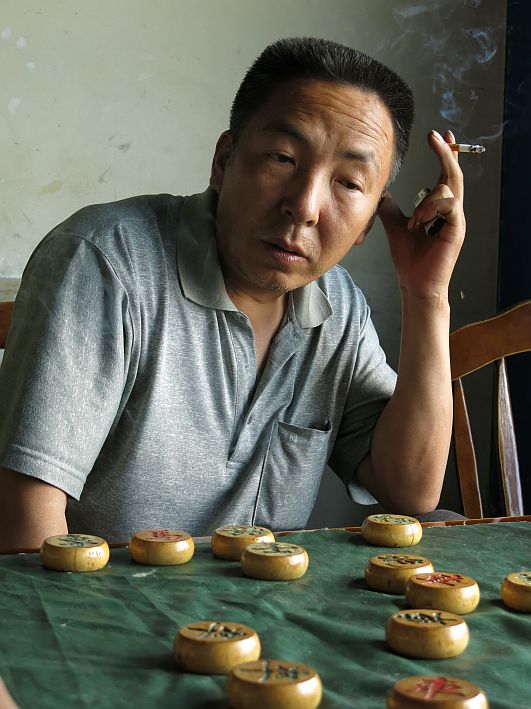
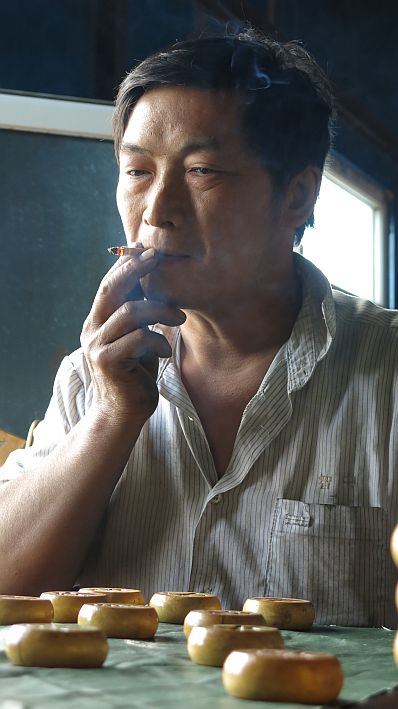
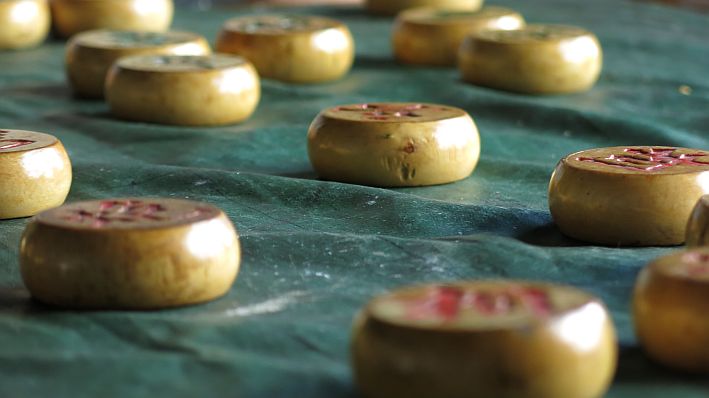
The toilets are utterly disgusting and still without partitions. The Chinese seem
to not be shy of finishing their business in front of other people at all, but I still
find it very strange to walk into a toilet room and find the women all sitting in a row.
The women often use even the “modern” toilets with the doors wide open.
There’s a lot of gossiping, telephoning and, above all, a lot of spitting going on.
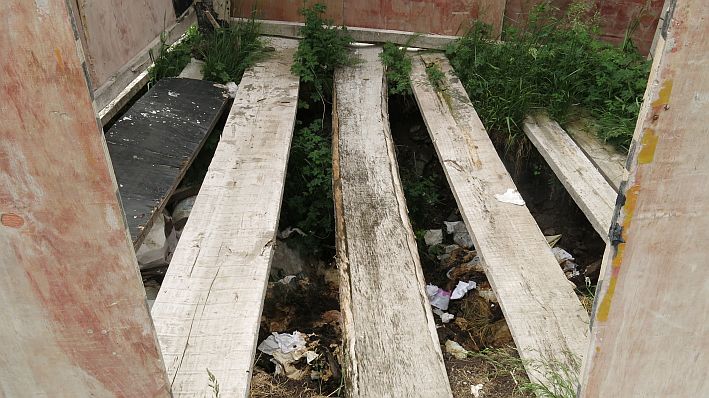
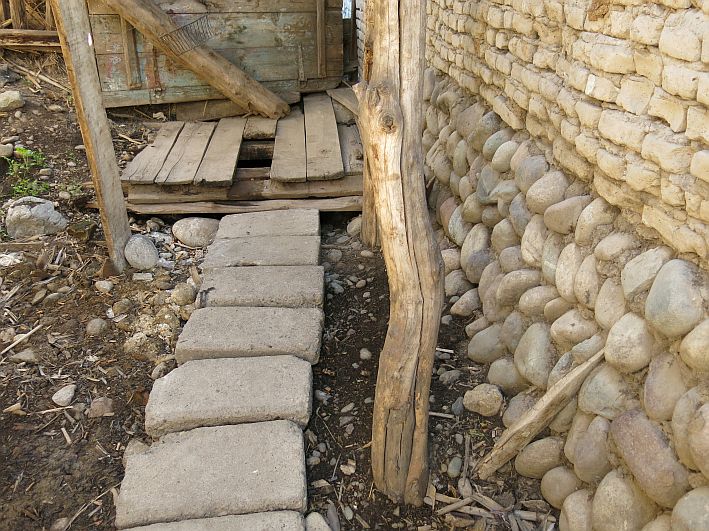

I had reached the crest of the last pass and then the road went non-stop downhill –
from 3200 meters down to an altitude of 200 meters – a stretch of about 80 kilometers.
The sudden heat nearly exhausted me, and I didn’t know quite how I would be able to survive it.
Just before sunset, it was still an unbearable 40 degrees. I rode my bike to a factory,
where I knocked on the door and was offered a bed. It would have been impossible for me
to endure the heat in my tent. An office room was prepared for me and then,
for the first time in my life, I voluntarily turned the air conditioner on. I was given
a thermos with hot water to wash myself and several watermelons,
which are more delicious here than anywhere else I had found on my trip up to now.
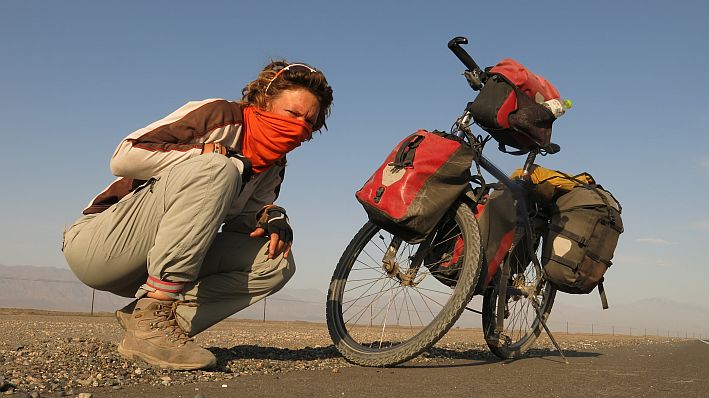
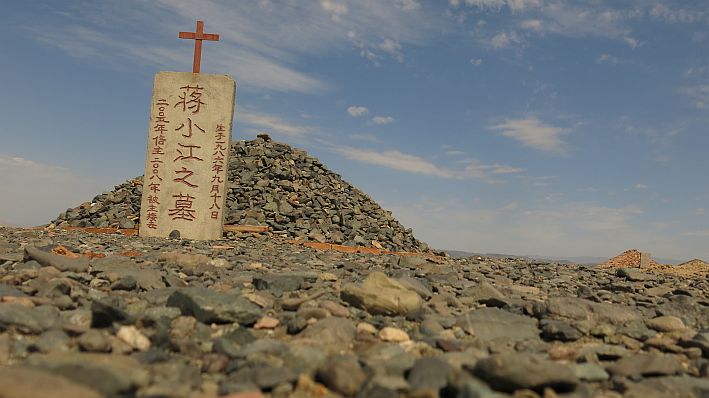
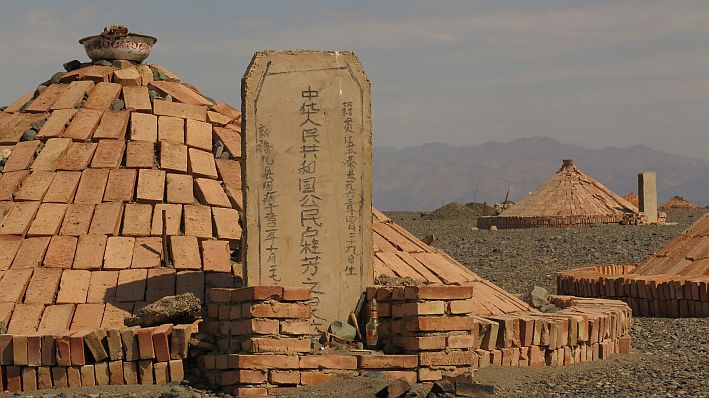
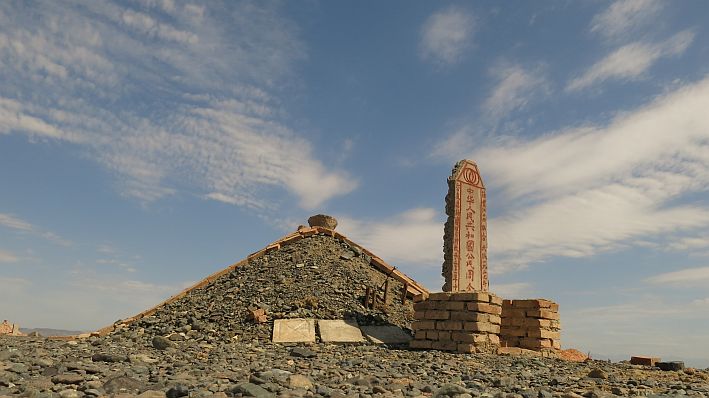
In the morning, I rode in excruciating heat through the desert towards Toksun.
I hadn’t eaten anything yet, but I drank a lot, and the searing heat suddenly nearly got to me.
I became dizzy and had the feeling I was going to vomit. My speedometer had already
stopped working in the heat and in the sun the thermometer had peaked
and stopped at 59 degrees. The only shade I could find was a huge road sign
that cast shadows on the highway, but the ground underneath was roasting.
There wasn’t a single cloud in the sky.
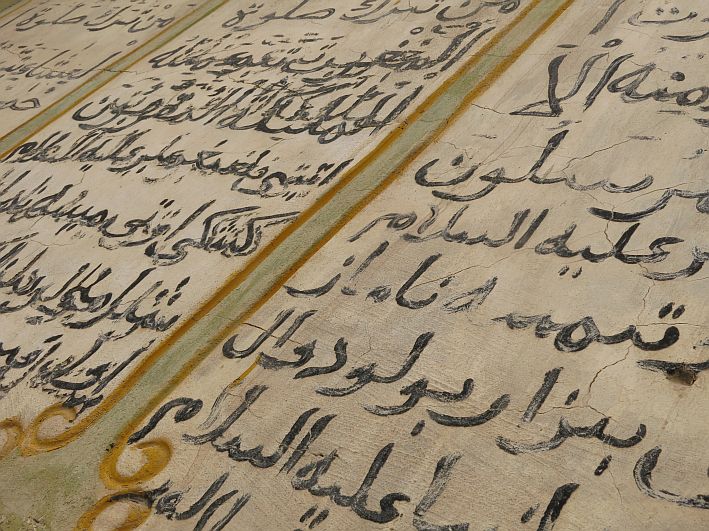
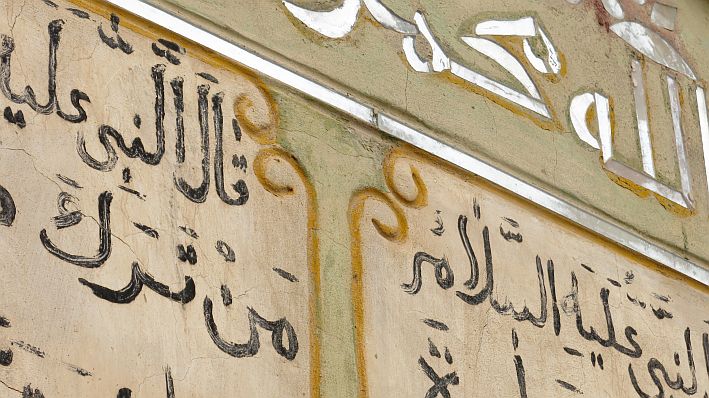
I saw a small house not too far distant and I hoped it might be a shop where there
were cold drinks, but I was honestly concerned that I might not make it that far.
Eventually, I pulled myself together and when I arrived I got lucky; there was an ice chest
that was functioning and the shopkeeper caught on immediately to what I needed.
He filled a bowl with ice water and gave me a lot to drink. I bathed my feet in ice,
soaked my T-shirt and pants with cold water, cooled my head with ice chunks
and repeatedly poured water on myself.
Not far from there was a place with water where the children were swimming.
About an hour later, when I felt like I had everything pretty much under control again,
I went into the water with them. Two hours later I was fine. However, from then on,
I knew that I would have to travel at night. So I waited until it was almost dark and,
although it was still 38 degrees, I continued onward.
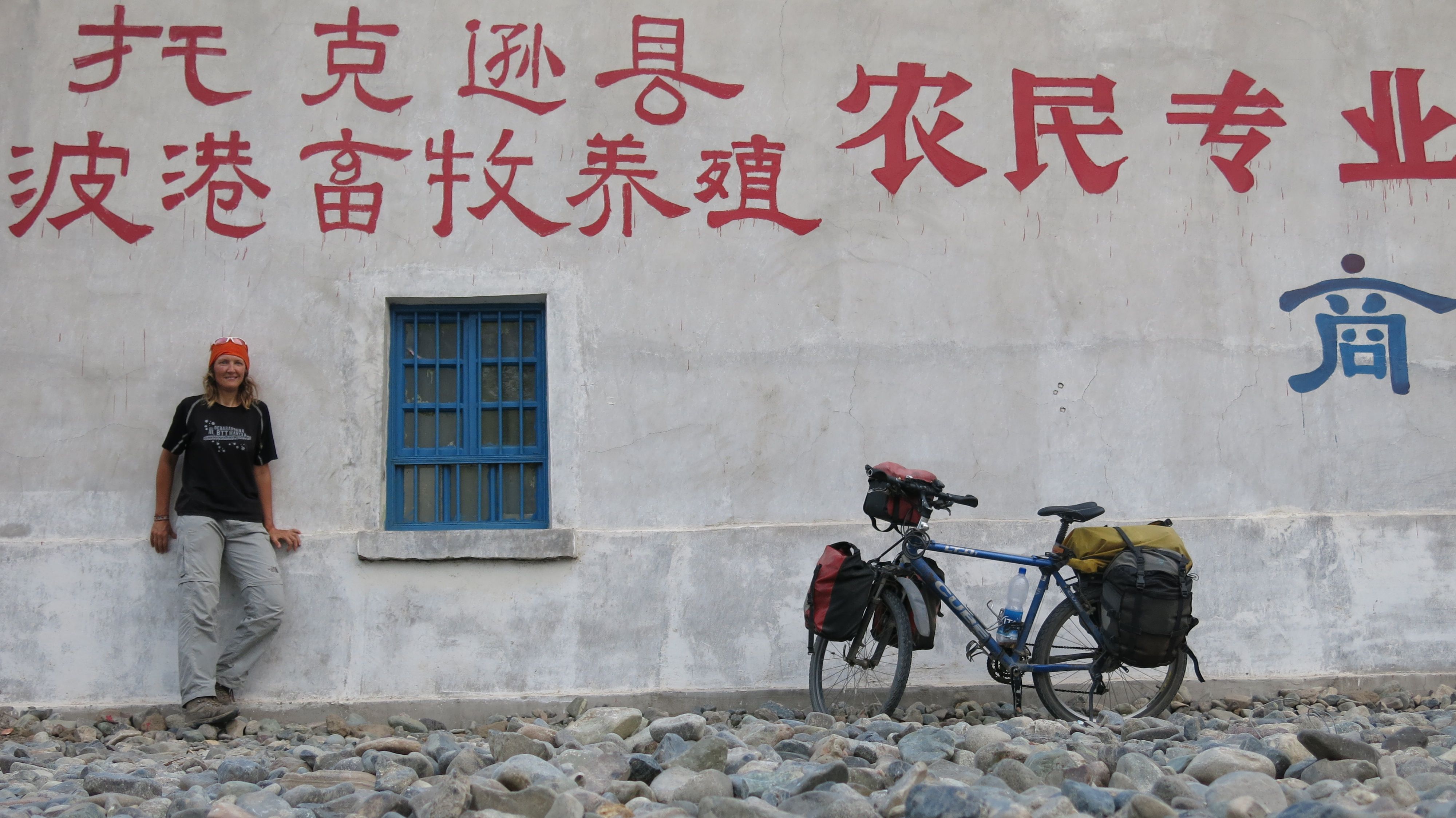
Around midnight I reached the city of Turfan – 150 meters below sea-level.
Shortly before arriving at the city gates, a mother and her daughter stopped me
and invited me to stay on a factory compound. It was the night of the final match
of the World Cup soccer games and I used their I-Phone translation program
to make it clear to them that I really wanted to see the game.
The kick-off was at exactly 3 a.m. The girl was lying beside me on the sofa
and she fell asleep quickly; outside the dogs were barking and I saw my first
and only game of the entire World Cup championships
and we Germans became the world champions.
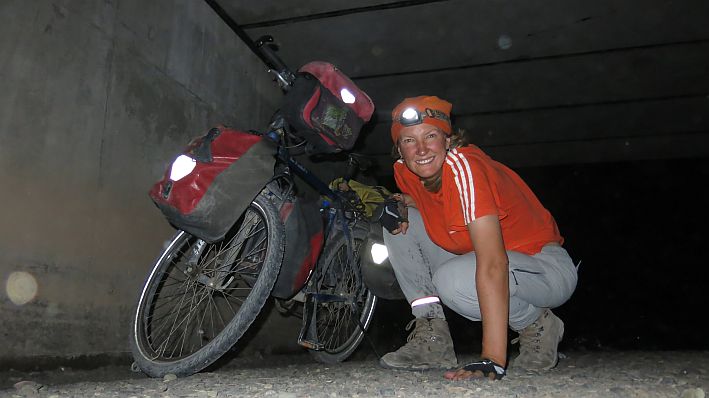
During the day, I always found a place to sit in air-conditioned restaurants
and waited for cooler temperatures. A few hours I was able to ride at night again,
but thunder and lightning would develop or a severe rainstorm would come up,
or I was just completely exhausted and couldn’t make any headway.
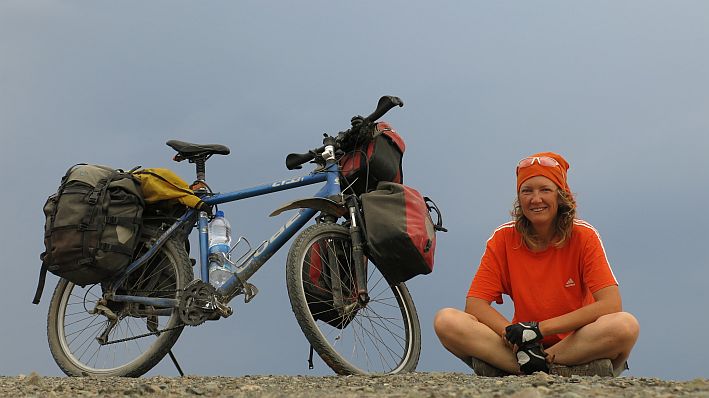
In Shanshan I decided to relax in a hotel room. So I started the annoying search
for a hotel again. In the $10 hotel, the receptionist was already shaking his head
from side to side. I tried to explain to her that she should write down a hotel for me
where I could stay that was in the same price category. Umpteen people were
involved and all of them wanted to know what the foreigner was trying to explain,
but no one understood. Finally, I was able to get them to write down the name
of the hotel. It was supposedly not far away. Over and over again, I showed
the slip of paper to people on the street and they always said the same thing
“go straight ahead.” After 5 km I found another hotel and asked them about the price.
Even there, they sent me on to the hotel that was on the slip because
it was supposed to be the cheapest for foreigners. Eventually, although the hotel
was supposed to be so near, I stood in front of a brand new luxury building
and everyone agreed that this was the hotel written on the slip of paper.
It is times like these in the life of a cycle traveler, where you begin to truly
doubt the minds of the people.
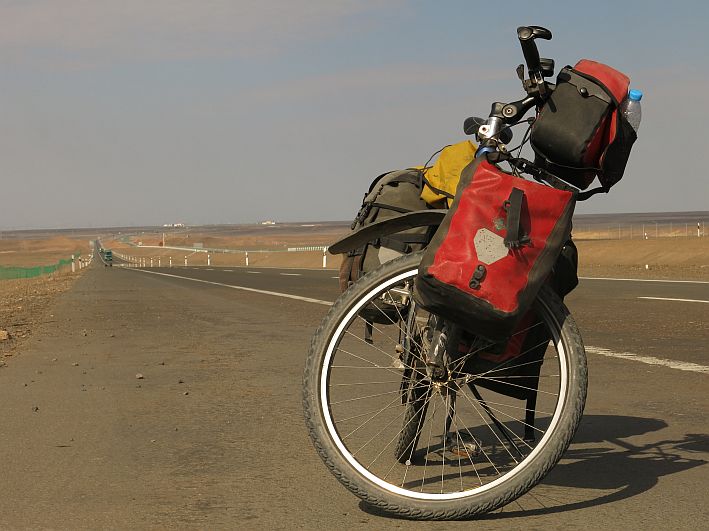
There were three men sitting in an eatery, who were watching me very intensely
and they kept glancing at their cell phones. Eventually, one of them approached me
and showed me a picture on the screen of myself and the Chinese man from Yazd
in the mountains. I figured they must somehow be friends and that he had sent them
the photograph. Yes, the world is sometimes a small village.
Out of sheer enthusiasm the three of them invited me to dinner.
In another restaurant I sat down on a chair and a few minutes later I was told
that the chair was totally dirty. And so it was; the backside of my only pair of trousers
was now more black than grey. I was never able to get the spots out again.
Oh well, what the heck!
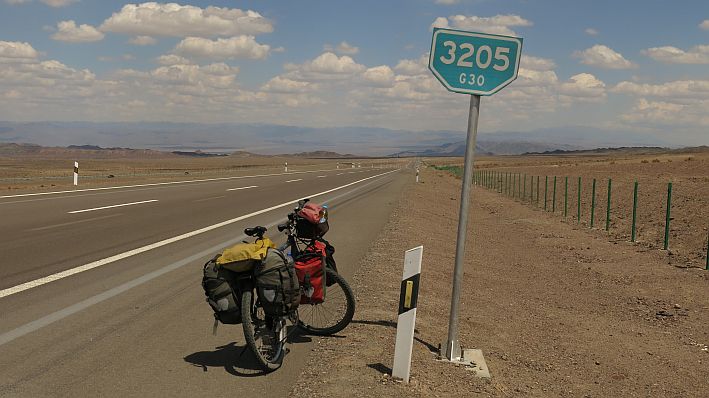
From then on, I could only continue on the super highway. Unfortunately
there were no alternatives, but the traffic wasn’t that heavy and the street
was in great condition and had a wide hard shoulder,
so I was able to make good headway.
I baptized that stretch of highway the Schnitzel Pee Trail.
Schnitzel because, lying in the roadside ditches, there were dead pigs
that probably didn’t survive the long truck transport in the heat and were simply
tossed into the ditch. Pee because there were countless plastic bottles along the roadside
that were half or three-quarters filled with yellow liquid. I could make no sense
of what it might be at first, but after a few days, I figured it could only be urine.
Truck drivers urinate in the bottles without stopping and then throw the bottles out the window.
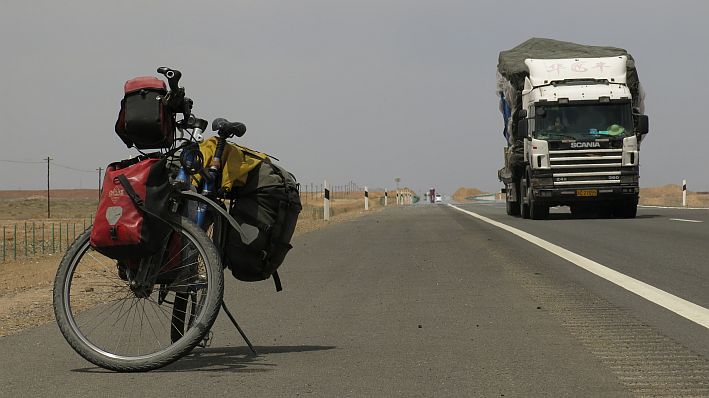
The Schnitzel Pee Trail stretched in a never-ending straight line. I rode through
the Gobi desert and I would say the scenery was exactly what you would imagine
a desert to be like. Empty and endless. But somehow it didn’t bother me.
I needed the break from humans so riding through the desert gave me a sense
of meditation, of emptiness, of resting. The bike almost pedaled itself;
I cycled more than 100 kilometers every day and was still not tired in the evening.
Sometimes I even had a slight tailwind.
The wind was a strange phenomenon because it kept changing all the time.
Sometimes I would be riding in a headwind, then, it suddenly came from behind.
10 kilometers later it would come from the side, and that happened in an area
where the road was straight as an arrow and everything was flat.
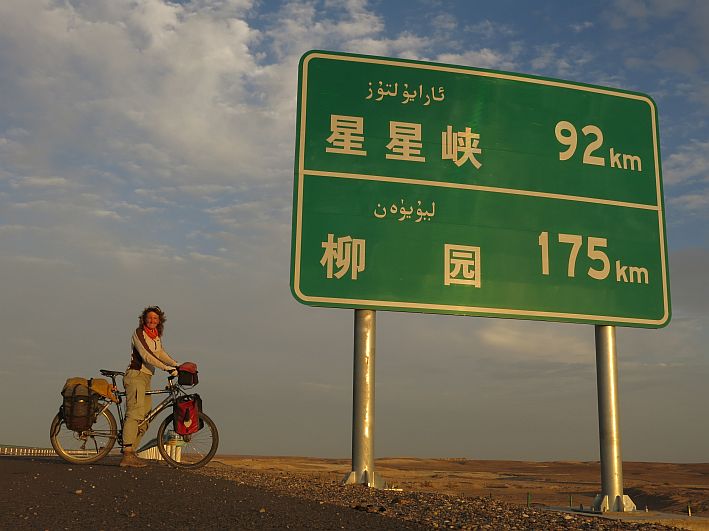
At short intervals under the highway, there were water drainage channels
where I could set up my tent wonderfully and sleep unseen. Admittedly,
it wasn’t the quietest place, but the noise was far less dramatic than you might
probably imagine when you read this.
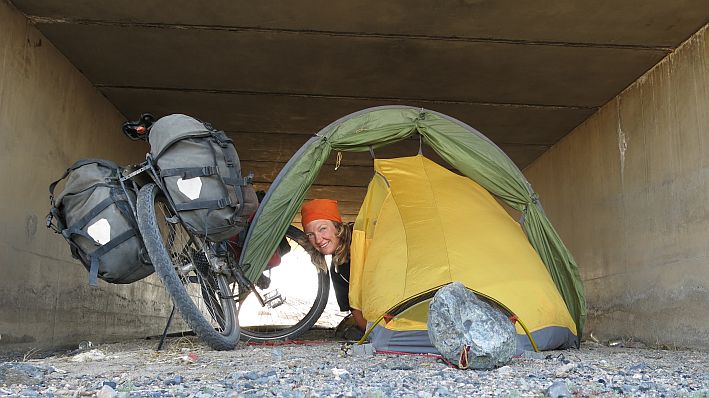
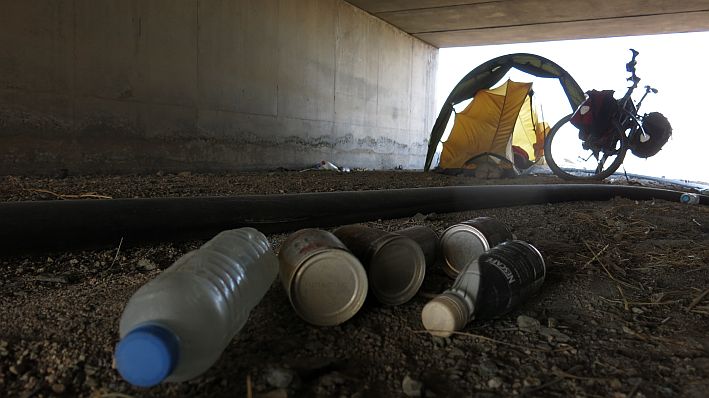
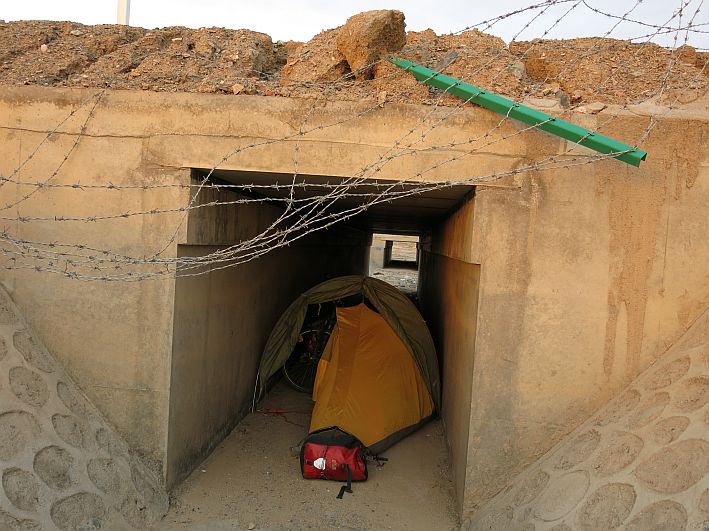
In the city of Hami, the influence of the Uyghur became less and less and I got
the impression that only Han Chinese lived there. The outer districts of the city
were an endless construction site – one skeleton of a skyscraper after another.
I wondered where all the people would come from that would want to move into them.
In Xingxingxia I had reached the end of the province of Xinjiang.
I had now passed through the largest Chinese province, larger than Alaska,
1650 kilometers and was at the border to Gansu.
Three male solo cyclists had arrived there at the same time and we camped
together in an abandoned factory – one Chinese man, one Japanese man
and one from Hong Kong. The Chinese man was circumnavigating China,
the Japanese fellow wanted to go to Europe and the Hong Kong Chinese cyclist
was on his way to Moscow.
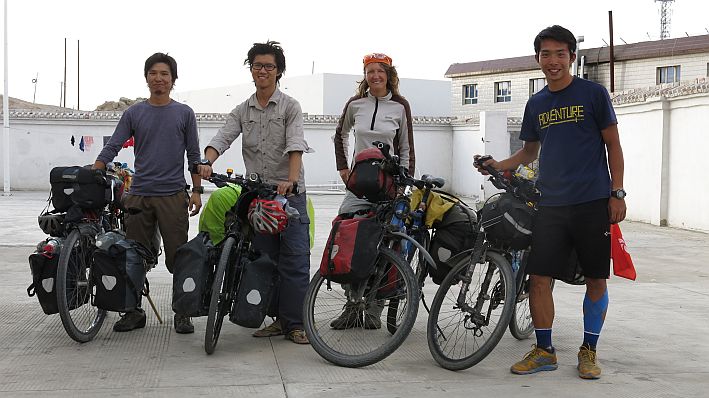
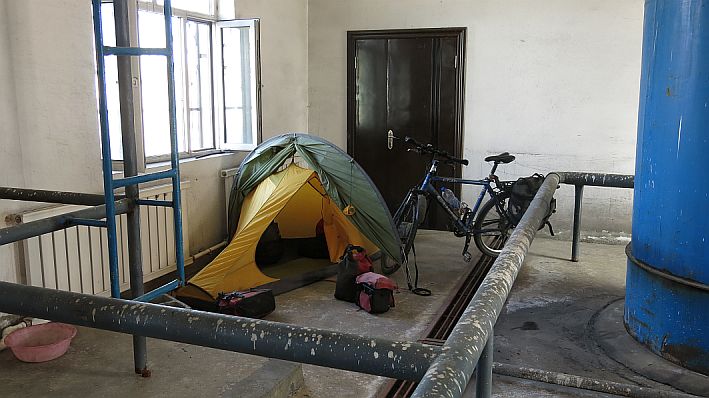
What happened in Gansu, I’ll let you know in the next blog entry.
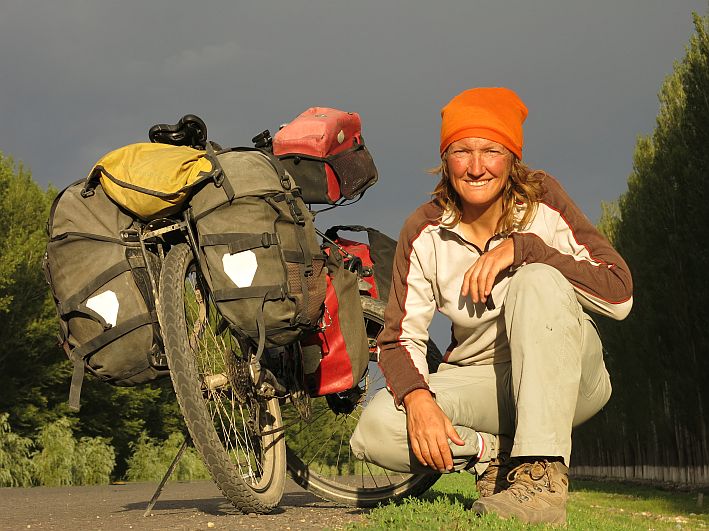
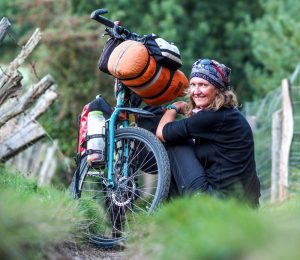


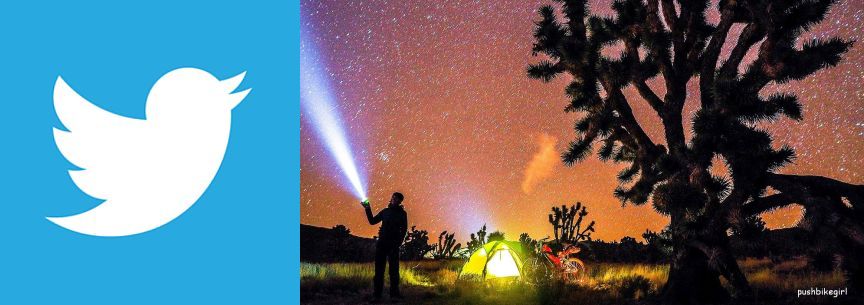


0 Comments